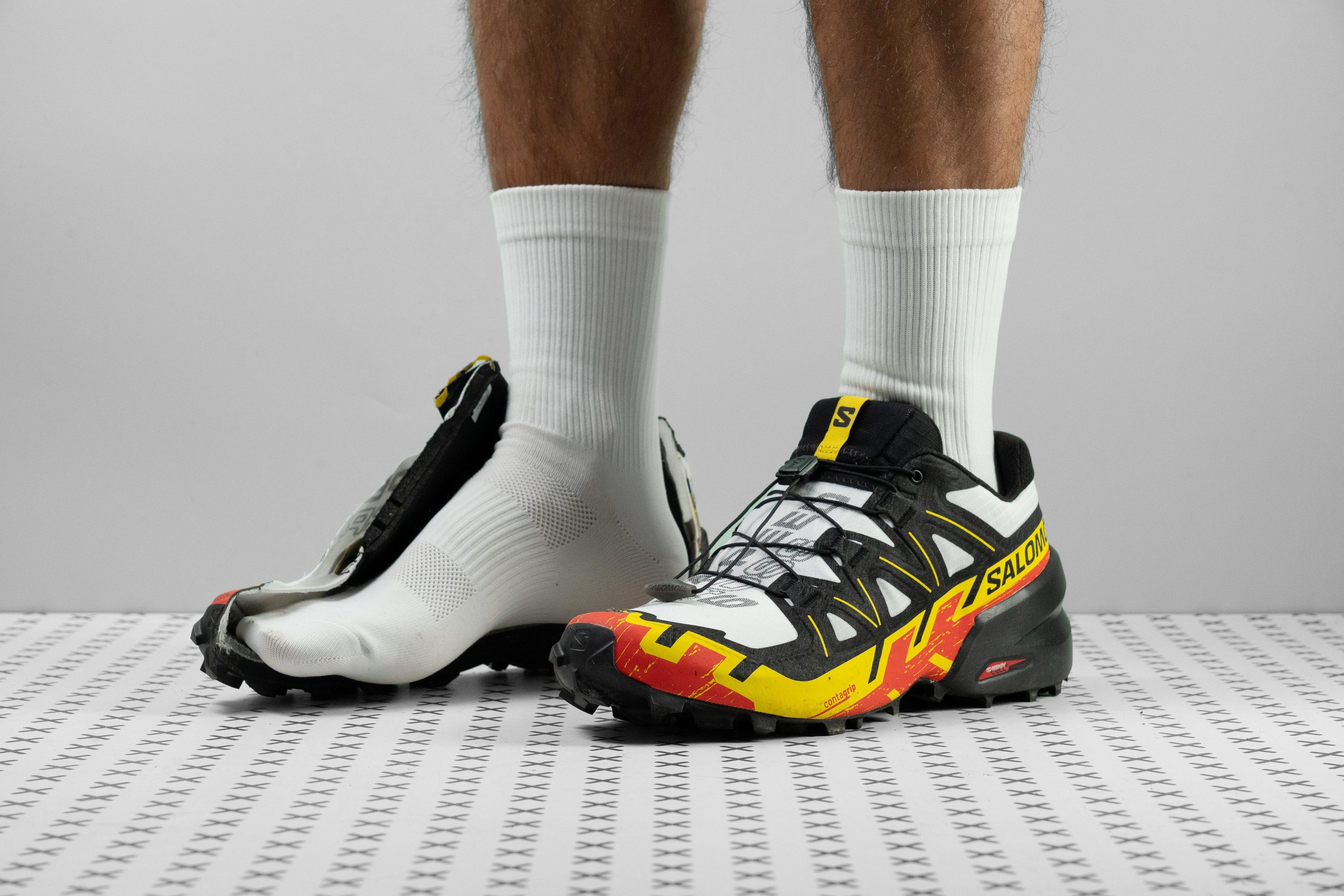Our verdict
- Top pick in best Salomon trail running shoes
- Top pick in best Salomon running shoes
Pros
- Ideal for heel strikers
- Impressive durability
- Quick mud shedding ability
- Lightest Speedcross yet
- Secure lockdown with QuickLace system
- Enhanced ground feel in the forefoot
- Agile and responsive in fast corners
Cons
- Midsole feels like concrete
- Extremely poor breathability
- Not suitable for midfoot and forefoot strikers
- Low energy return
Audience verdict
- Top 26% in trail running shoes
- Top 24% in Salomon running shoes
- Top 19% most popular running shoes
Comparison
The most similar running shoes compared
+ + Add a shoe | |||||
|---|---|---|---|---|---|
| Audience score | 89 Great! | 81 Good! | 90 Superb! | 87 Great! | |
| Price | $145 | $85 | $150 | $165 | |
| Trail terrain | Technical | Light | ModerateTechnical | Technical | |
| Shock absorption | Low | Moderate | Moderate | - | |
| Energy return | Low | Low | Low | - | |
| Traction | - | - | High | - | |
| Arch support | Neutral | Neutral | Neutral | Neutral | |
| Weight lab Weight brand | 10.4 oz / 296g 10.5 oz / 298g | 10.3 oz / 292g 10.4 oz / 296g | 9.8 oz / 278g 9.8 oz / 278g | 11.4 oz / 323g 10.7 oz / 303g | |
| Drop lab Drop brand | 14.1 mm 10.0 mm | 10.1 mm 8.0 mm | 11.5 mm 6.0 mm | 11.3 mm 10.0 mm | |
| Strike pattern | Heel | Heel | Heel | Heel | |
| Size | True to size | True to size | - | Half size small | |
| Midsole softness | Firm | Balanced | Balanced | Firm | |
| Difference in midsole softness in cold | Small | Normal | Small | Small | |
| Plate | ✗ | ✗ | Rock plate | ✗ | |
| Toebox durability | Good | Very bad | Decent | Good | |
| Heel padding durability | Decent | Bad | Decent | Good | |
| Outsole durability | Decent | Decent | Good | Decent | |
| Breathability | Warm | Moderate | Moderate | Moderate | |
| Width / fit | Medium | Medium | Medium | Narrow | |
| Toebox width | Medium | Medium | Narrow | Medium | |
| Stiffness | Moderate | Flexible | Moderate | Stiff | |
| Torsional rigidity | Stiff | Stiff | Stiff | Stiff | |
| Heel counter stiffness | Stiff | Stiff | Moderate | Moderate | |
| Lug depth | 5.8 mm | 4.0 mm | 5.0 mm | 5.0 mm | |
| Heel stack lab Heel stack brand | 36.5 mm 32.0 mm | 37.7 mm 36.0 mm | 36.1 mm 32.0 mm | 33.2 mm 26.0 mm | |
| Forefoot lab Forefoot brand | 22.4 mm 22.0 mm | 27.6 mm 28.0 mm | 24.6 mm 26.0 mm | 21.9 mm 16.0 mm | |
| Widths available | NormalWide | Normal | NormalWide | Normal | |
| For heavy runners | ✗ | ✓ | ✗ | ✗ | |
| Season | Winter | All seasons | All seasons | All seasons | |
| Removable insole | ✓ | ✓ | ✓ | ✓ | |
| Orthotic friendly | ✓ | ✓ | ✓ | ✓ | |
| Ranking | #103 Top 27% | #307 Bottom 19% | #56 Top 15% | #154 Top 41% | |
| Popularity | #72 Top 19% | #232 Bottom 39% | #300 Bottom 21% | #270 Bottom 29% |
Who should buy
We consider the Salomon Speedcross 6 a great choice for:
- Enthusiasts of firm midsoles and Salomon's QuickLace system looking for a speedy, agile trail running shoe.
- Those seeking a rugged trail shoe optimized for winter running and early-season trails.
- Trail runners with wide feet who prioritize speed and agility on technical terrain over long-distance adventures.
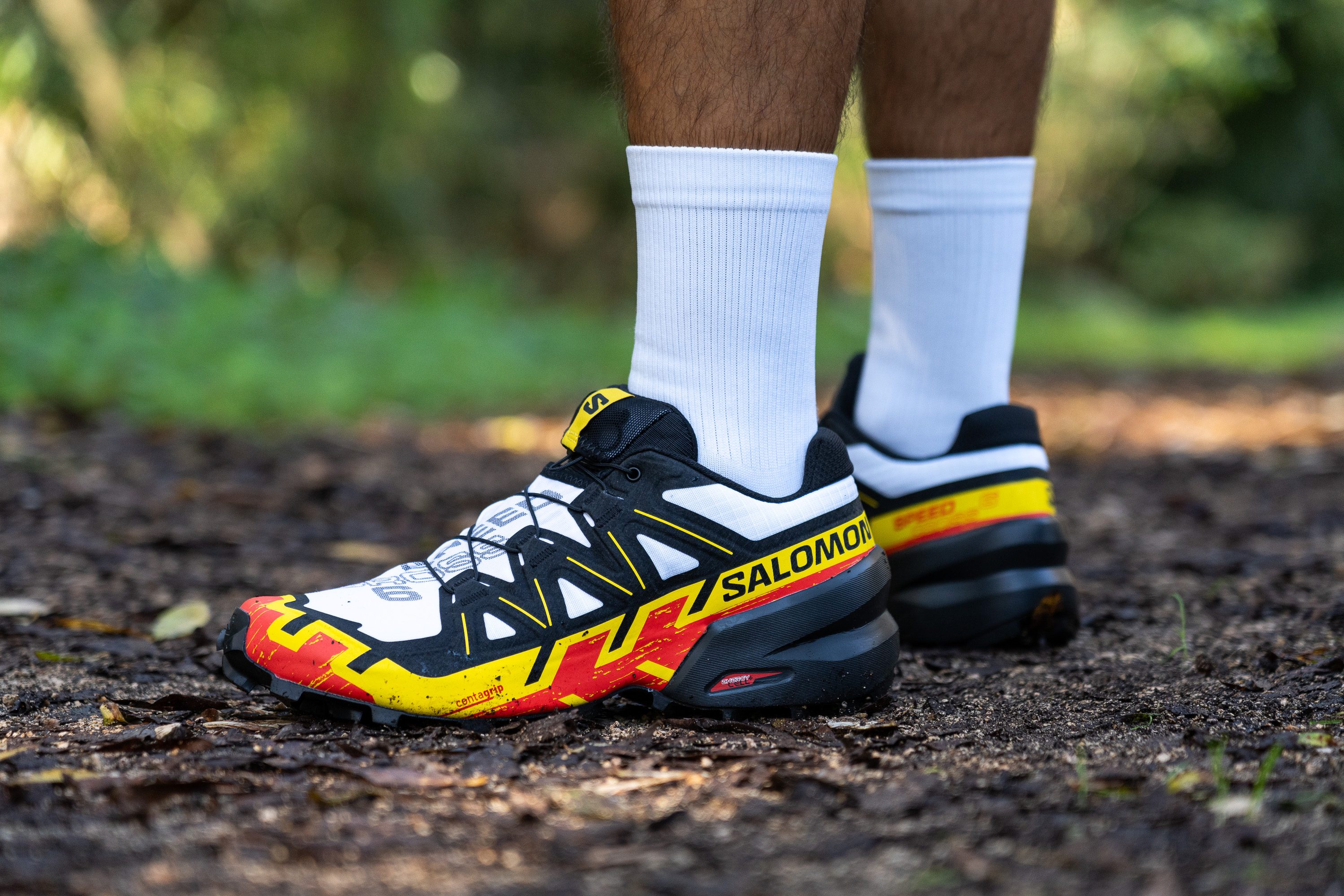
Who should NOT buy
The Salomon Speedcross 6 offers a firm midsole providing ground feel, but it might not appeal to those who prefer squishy cushioning. If you fall into that category, we favor alternatives like the Hoka Speedgoat 5 or the New Balance Fresh Foam X Hierro v7, which offer a softer ride.
Additionally, this shoe can get incredibly warm during summer runs. For mountain adventures in warmer months, we believe you'd be better off with a shoe featuring exceptional breathability, such as the Brooks Cascadia 17.
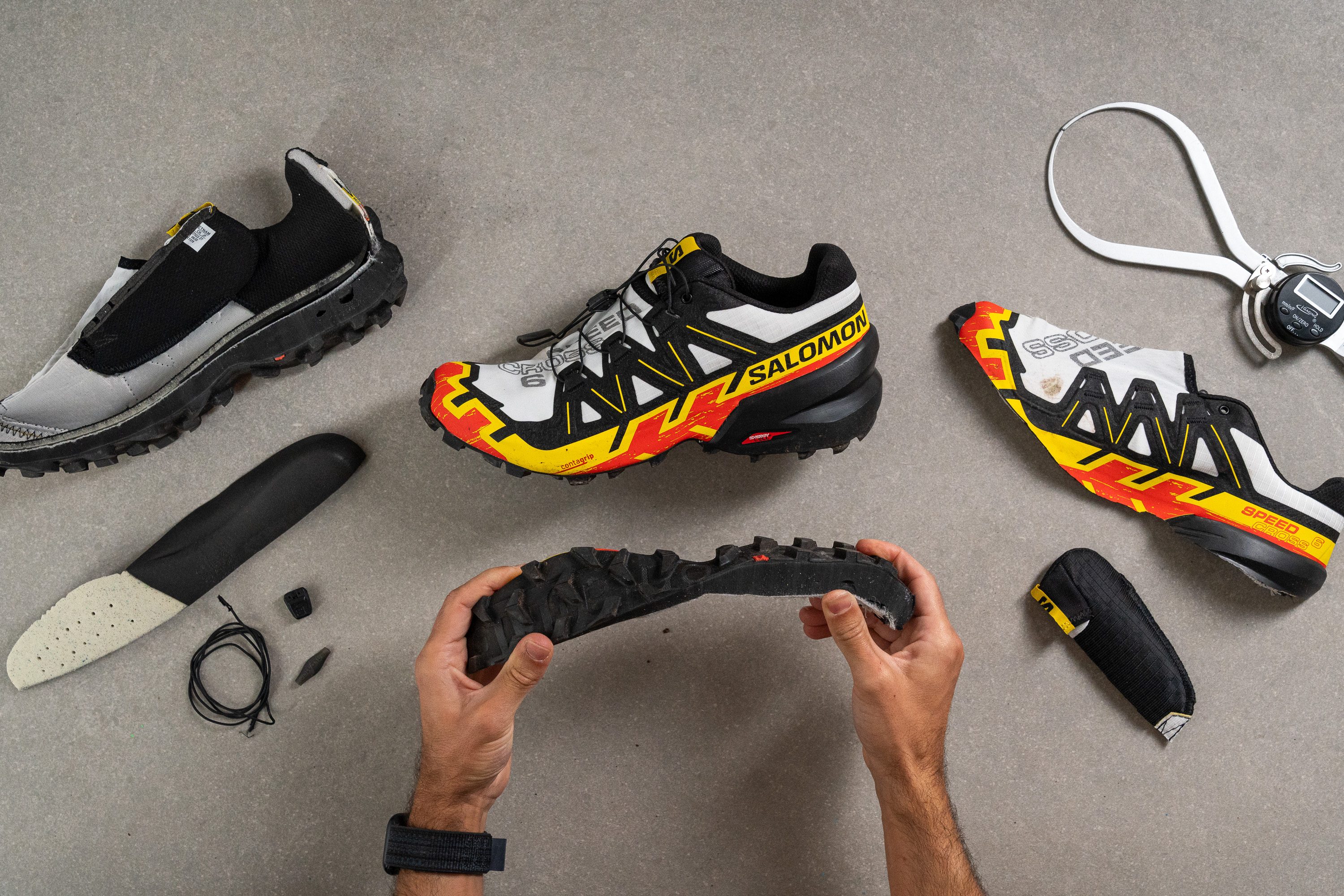
Cushioning
Shock absorption
The Speedcross 6, despite having a substantial amount of foam in the heel, only scored 96 SA.
That’s because the EVA foam Salomon uses isn’t particularly effective—in fact, quite the opposite. The forefoot, at 80 SA, is also best suited for runners who don’t need much underfoot protection for longer distances… or simply love a less cushioned ride.
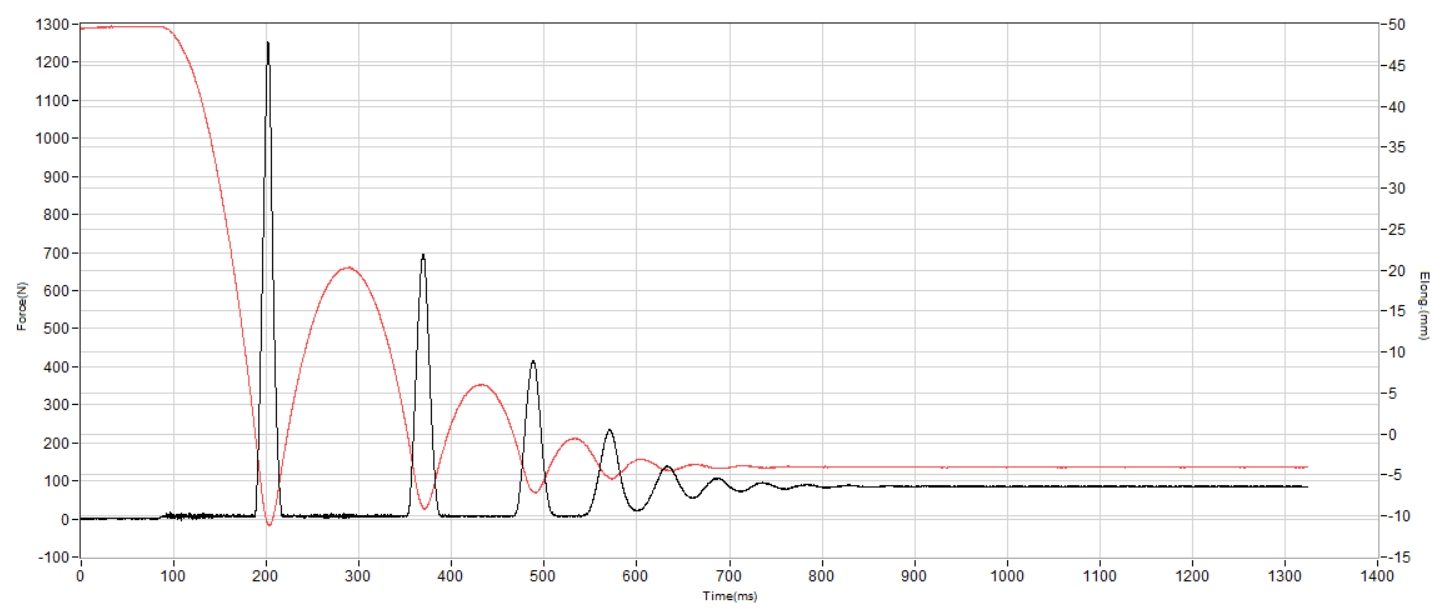
| Speedcross 6 | 96 SA |
| Average | 122 SA |
Energy return
We tested its energy return and found a disappointing 47.4%. That's a number that felt outdated and underwhelming during runs.
At this point, we think Salomon’s foam tech could benefit from a modern, responsiveness-driven upgrade to keep pace with today’s trail shoes.
| Speedcross 6 | 47.4% |
| Average | 55.3% |
Heel stack
We measured a stack height of 36.5 mm in the Speedcross 6, categorizing it as a maximal shoe numerically, but there's a caveat.
Due to its large lugs and thick insole, there isn't much space left for the midsole. So, don't expect the extreme cushioning found in shoes like the Nike Ultrafly, and it's definitely not suited for ultra-long distances.
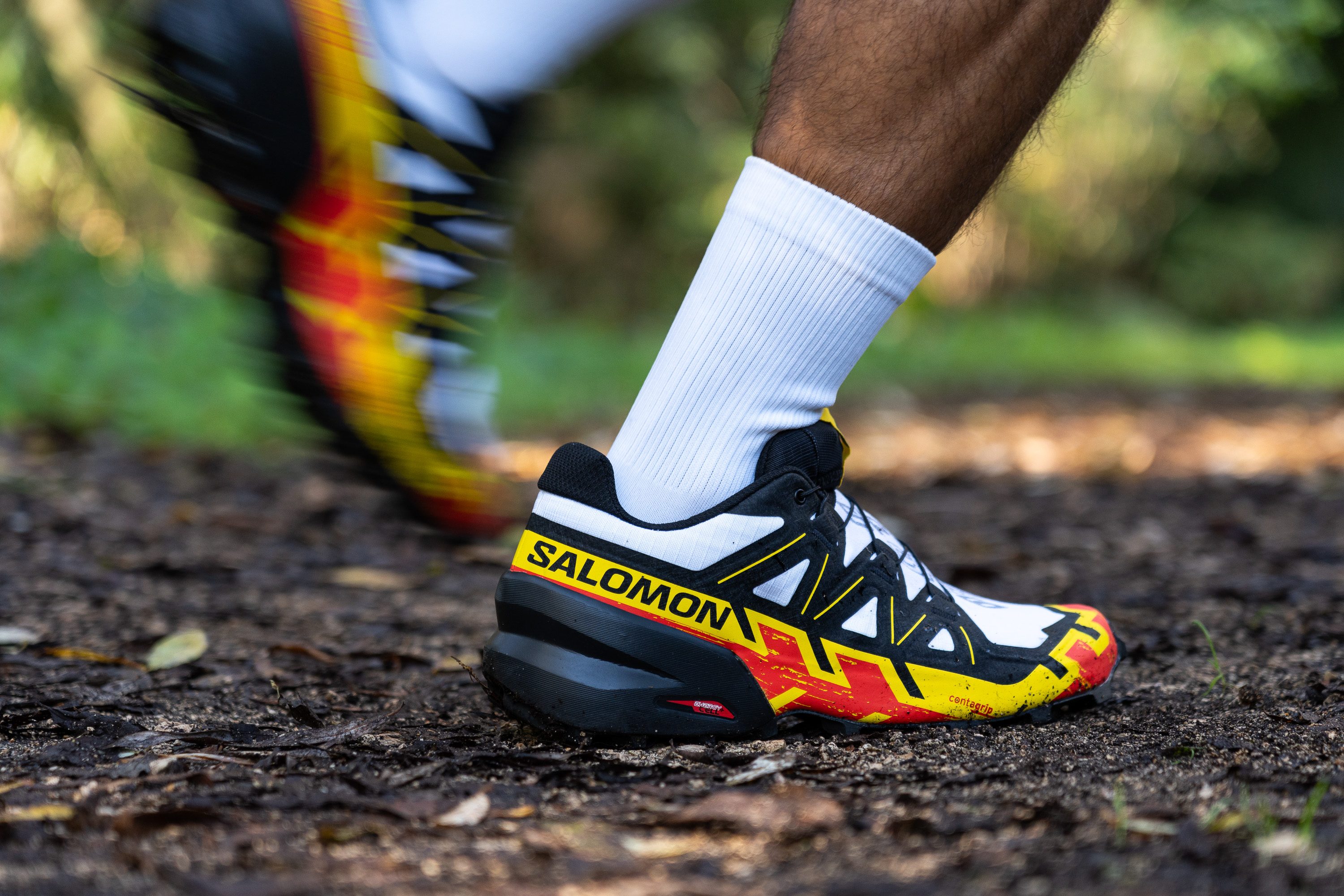
Additionally, it's worth mentioning that the Speedcross 6 does not include a rock plate. However, considering the thick layer of rubber that separates the midsole from the ground, we believe omitting the rock plate was a smart decision.
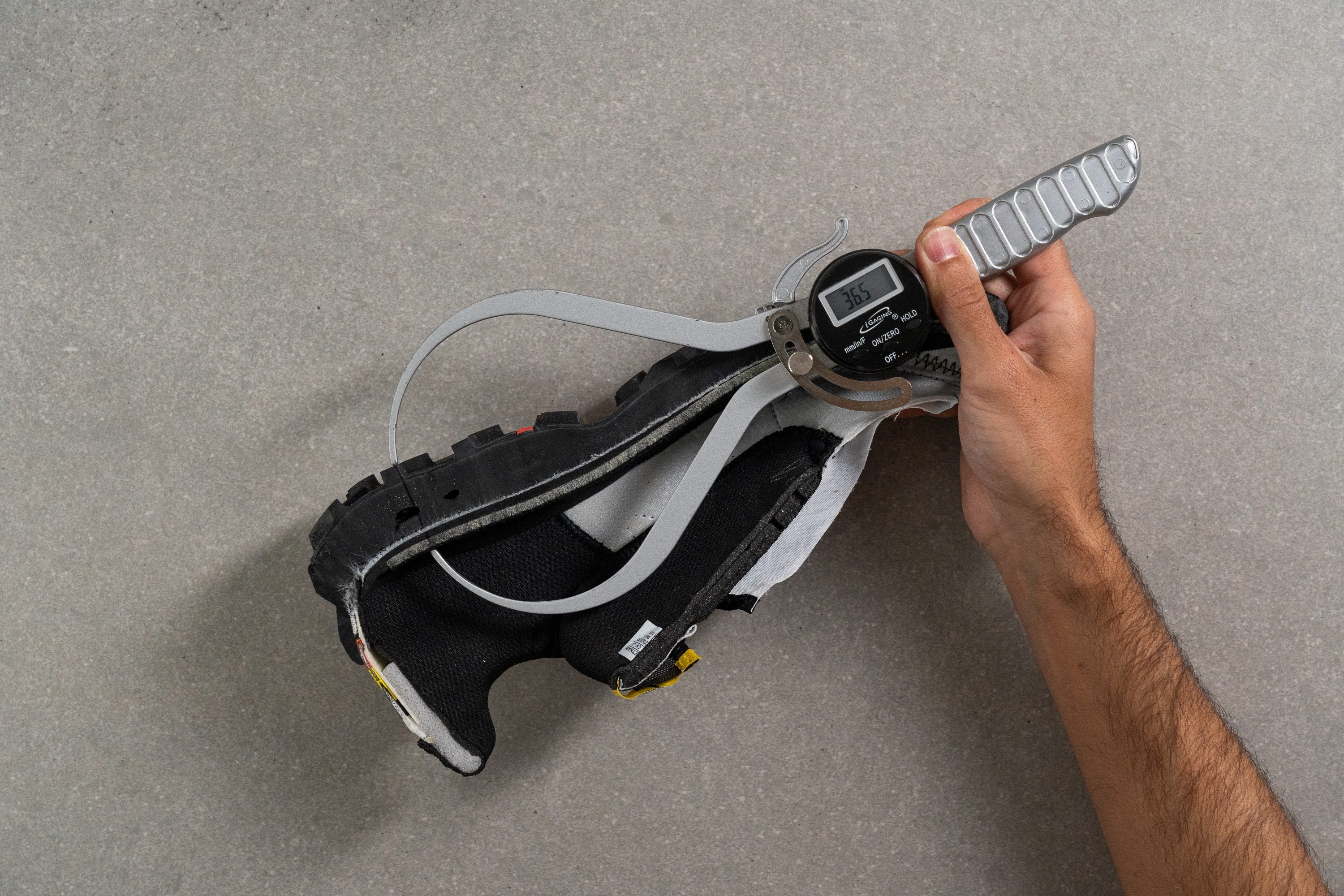
| Speedcross 6 | 36.5 mm |
| Average | 32.6 mm |
Forefoot stack
With a mere 22.4 mm thickness in the forefoot, the foam here is minimal. This makes it a less-than-ideal option for forefoot strikers who typically seek more cushioning.
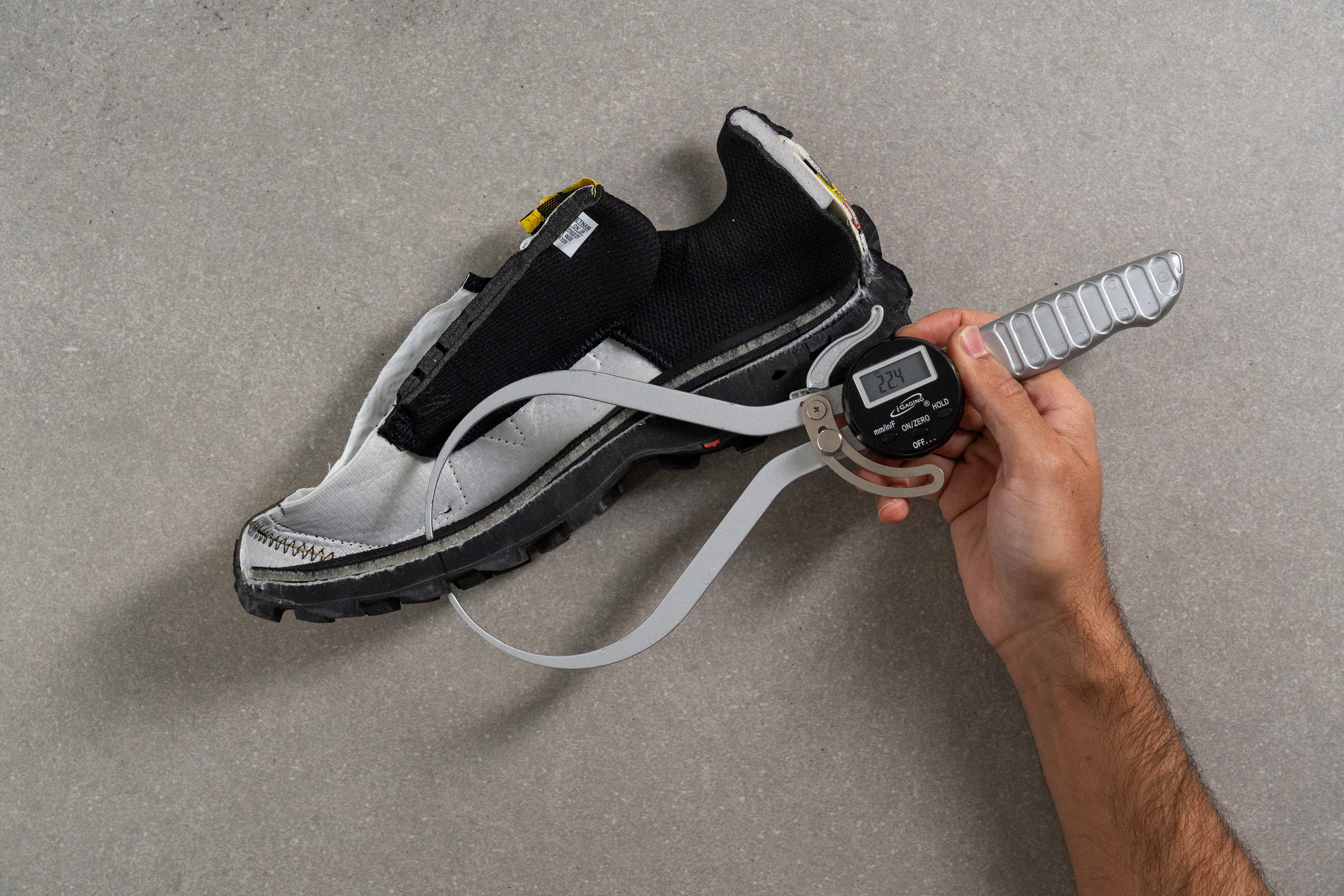
| Speedcross 6 | 22.4 mm |
| Average | 25.1 mm |
Drop
The drop on this shoe is quite remarkable. We measured a 14.1 mm drop following the official World Athletics procedure.
However, due to the shoe's unique geometry, it feels more akin to an 8-to-10-mm shoe. Regardless, it's definitely designed with heel strikers in mind.
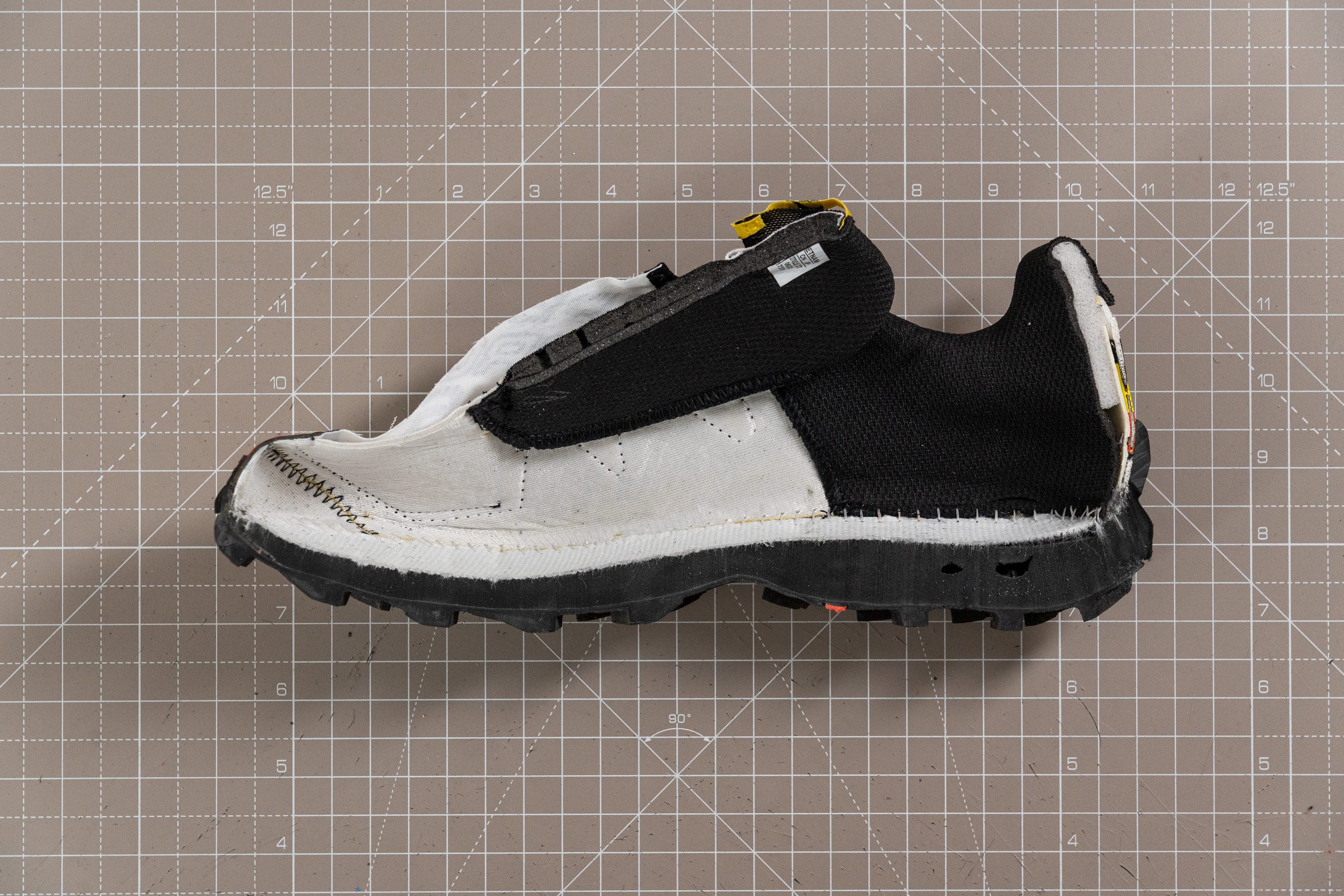
| Speedcross 6 | 14.1 mm |
| Average | 7.6 mm |
Midsole softness
UpdatedBased on our test runs, we anticipated a high reading on our durometer since the shoe definitely feels firm.
With a whooping measurement of 52.9 AC, it's mainly appealing to those who prefer a firm, almost stone-hard running experience.
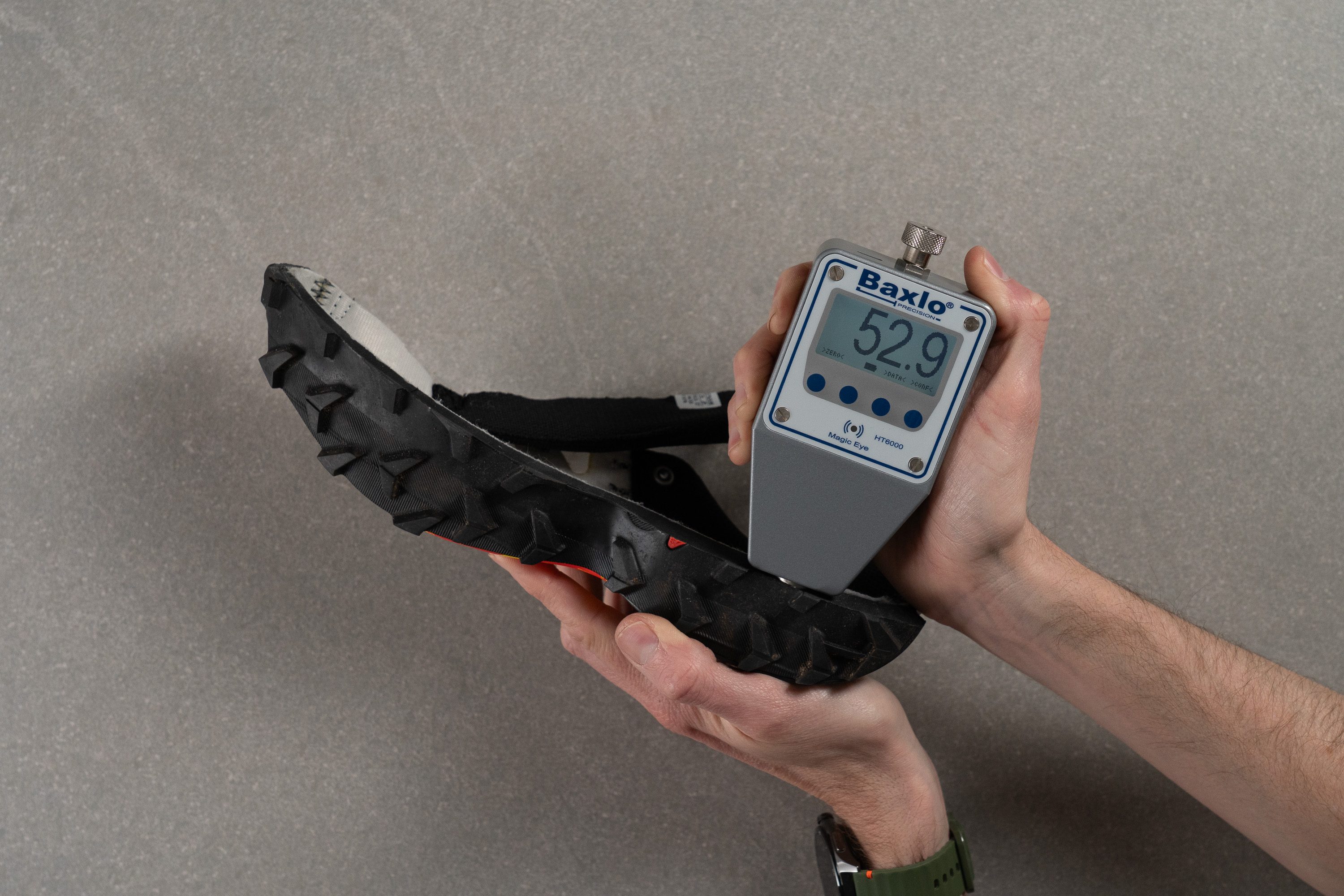
| Speedcross 6 | 52.9 AC |
| Average | 37.5 AC |
Size and fit
Size
Salomon Speedcross 6 fits true to size (52 votes).
Internal length
| Speedcross 6 | 272.7 mm |
| Average | 269.0 mm |
Width / Fit
Through our evaluation, we crafted a precise gel mold of the shoe's interiors and measured its widest section at 95.3 mm.
We think that this well-balanced design comfortably supports runners with average-width feet and even accommodates slightly narrow or moderately wide feet.
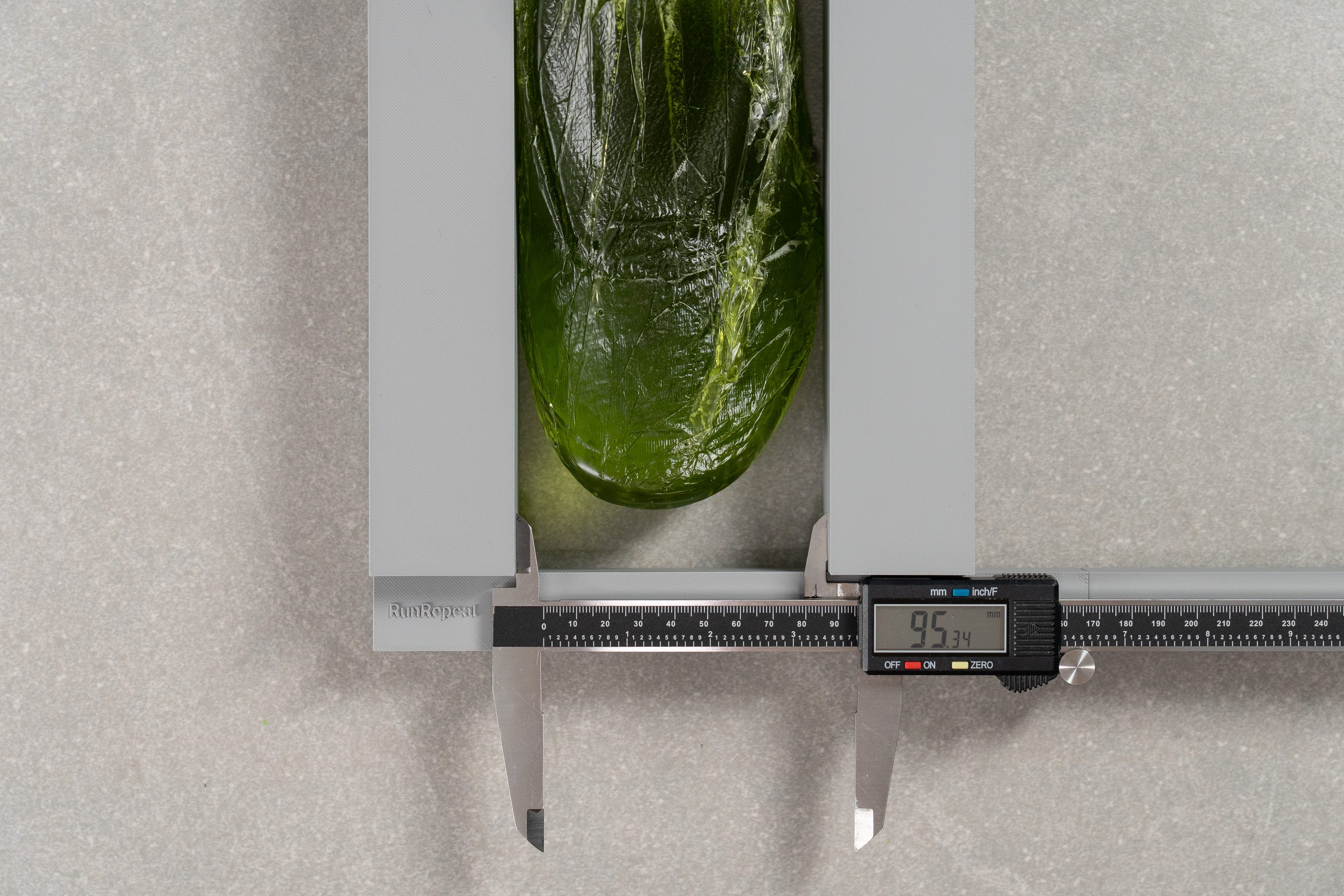
| Speedcross 6 | 95.3 mm |
| Average | 95.6 mm |
Toebox width
The big toe area isn’t overly spacious but offers adequate comfort for most feet, featuring a moderate taper measured at 75.2 mm.
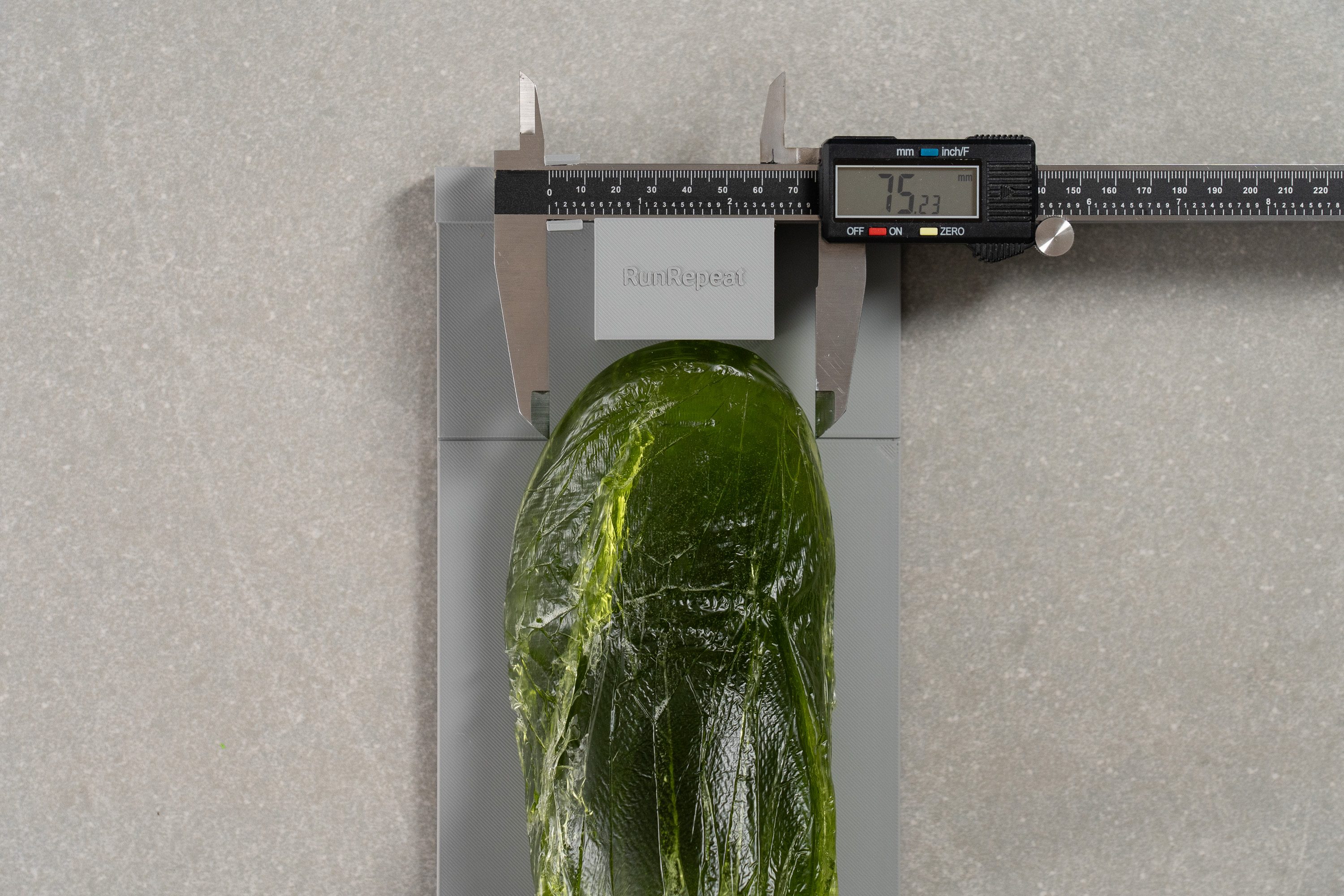
| Speedcross 6 | 75.2 mm |
| Average | 74.6 mm |
Toebox height
However, we found the toebox height to be quite limited at just 23.8 mm, which could cause discomfort for runners with higher-volume feet.
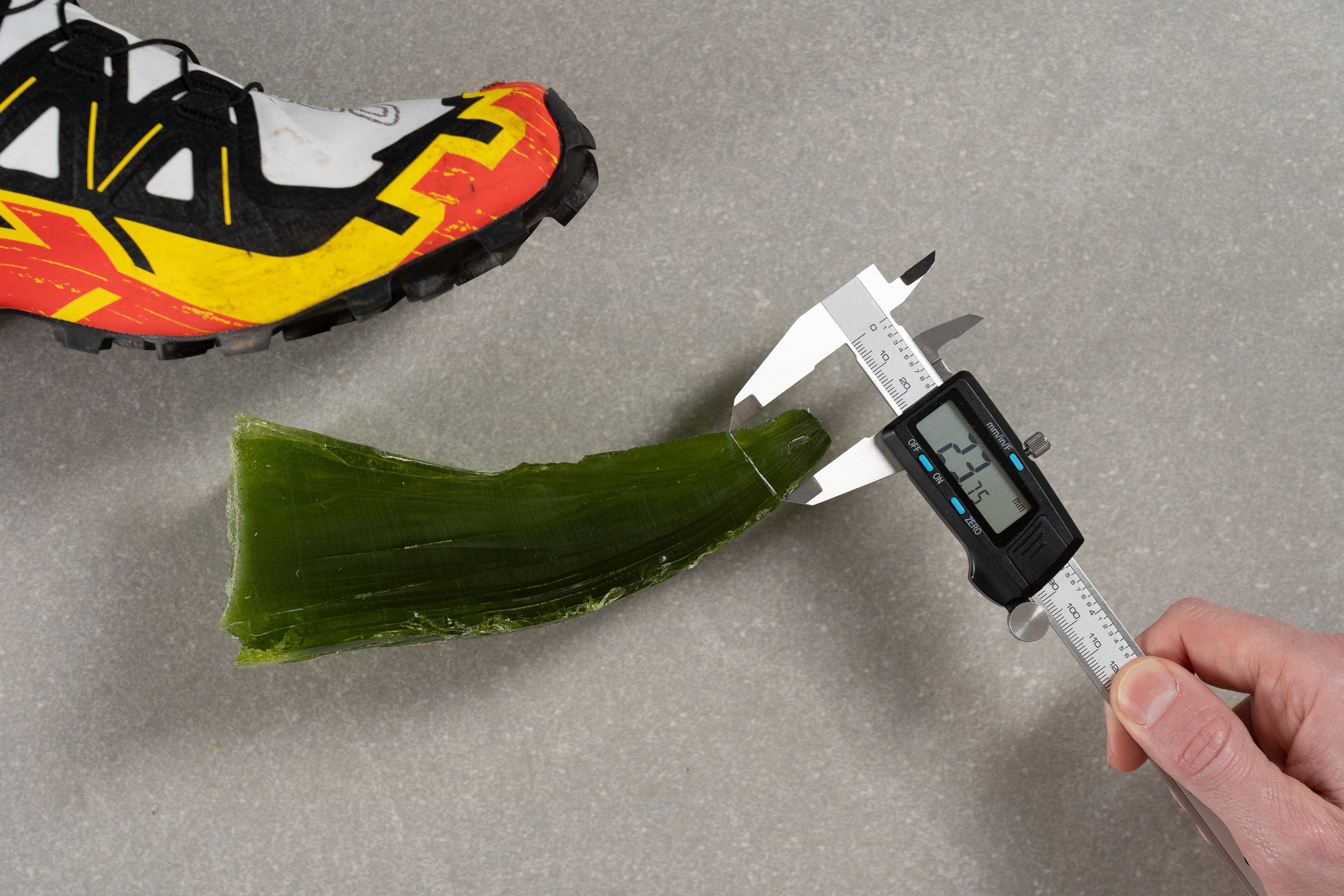
| Speedcross 6 | 23.8 mm |
| Average | 27.0 mm |
Traction / Grip
Forefoot traction
| Speedcross 6 | |
| Average | 0.61 |
Lug depth
As we mentioned earlier, the lugs on this shoe are gigantic. Measuring 5.8 mm, they are almost twice the average depth.
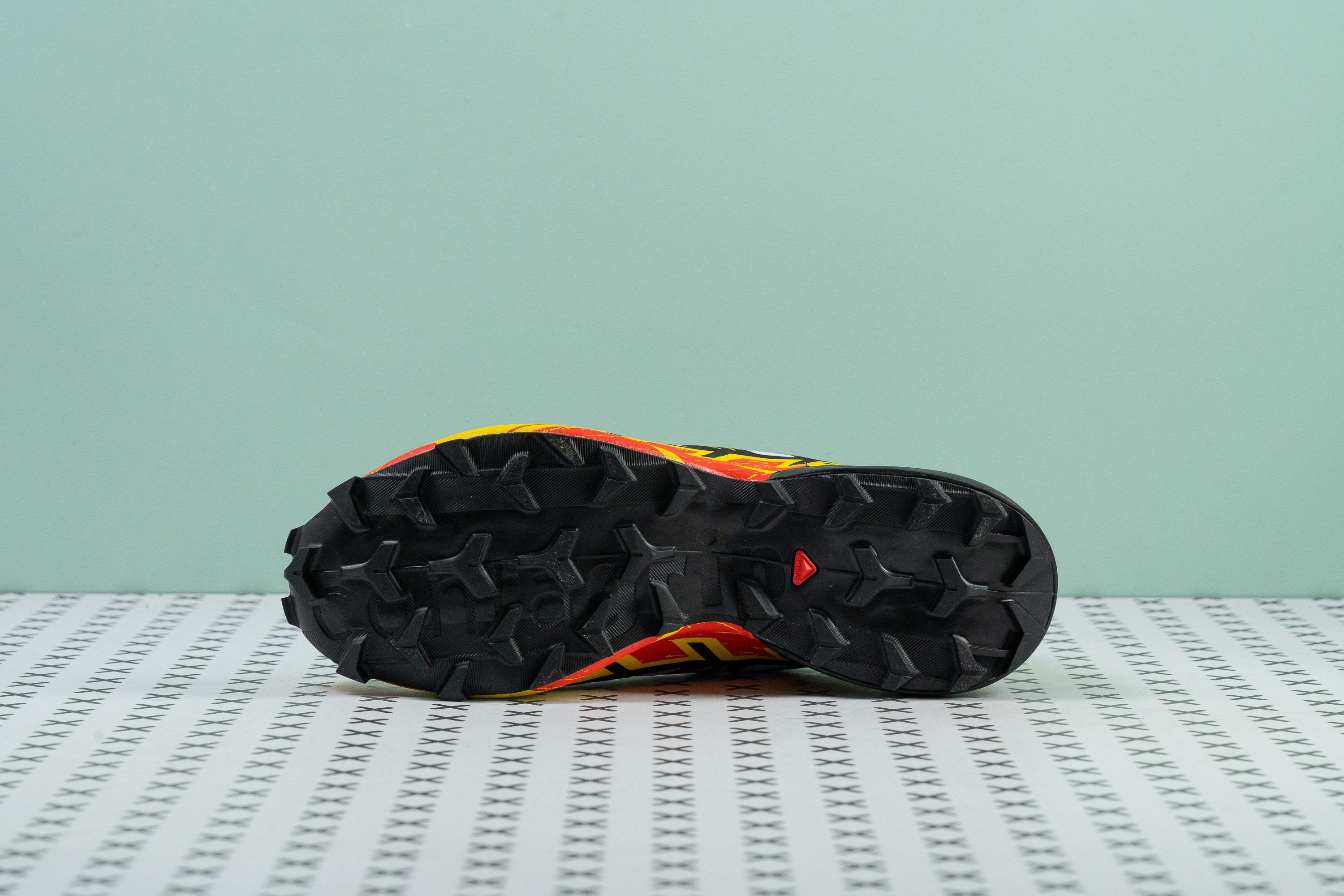
This design has a few implications. First and foremost, this shoe isn't made for easy, blazing-fast flat trails. Instead, with almost 6 mm of depth, these lugs are clearly designed for muddy, challenging terrains. The large gaps between them help clear mud, and their shape is also crafted to aid in this process.
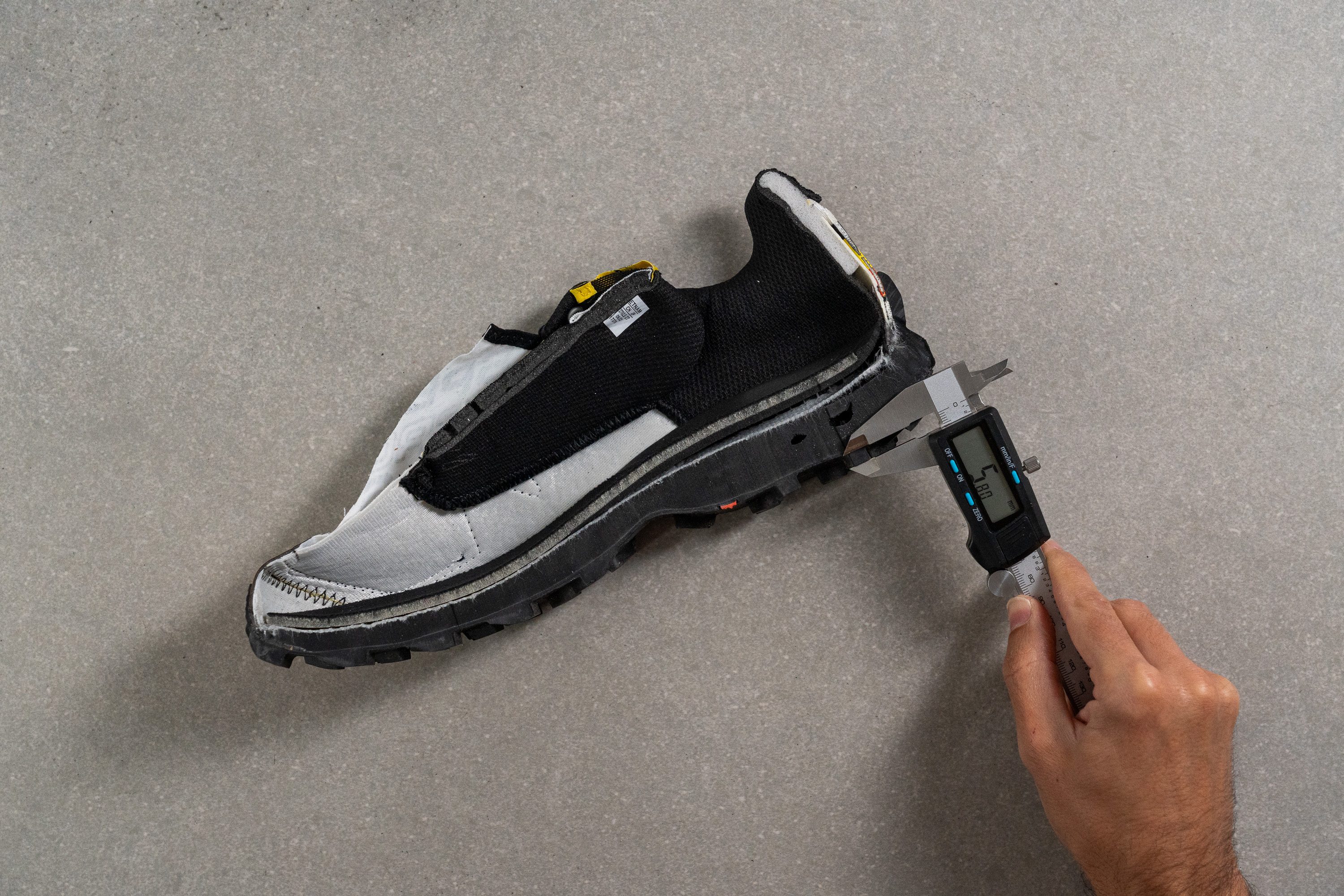
| Speedcross 6 | 5.8 mm |
| Average | 3.5 mm |
Outsole design
The Speedcross 6 features a full-length rubber outsole with no exposed foam, maximizing protection across the entire base. The compound is Salomon’s proprietary Contragrip, built into a single molded layer that wraps around the midsole edges for added durability.
The forefoot and heel include deep, arrow-shaped lugs arranged in opposing directions. Lug spacing is generous, allowing room for debris and mud release.
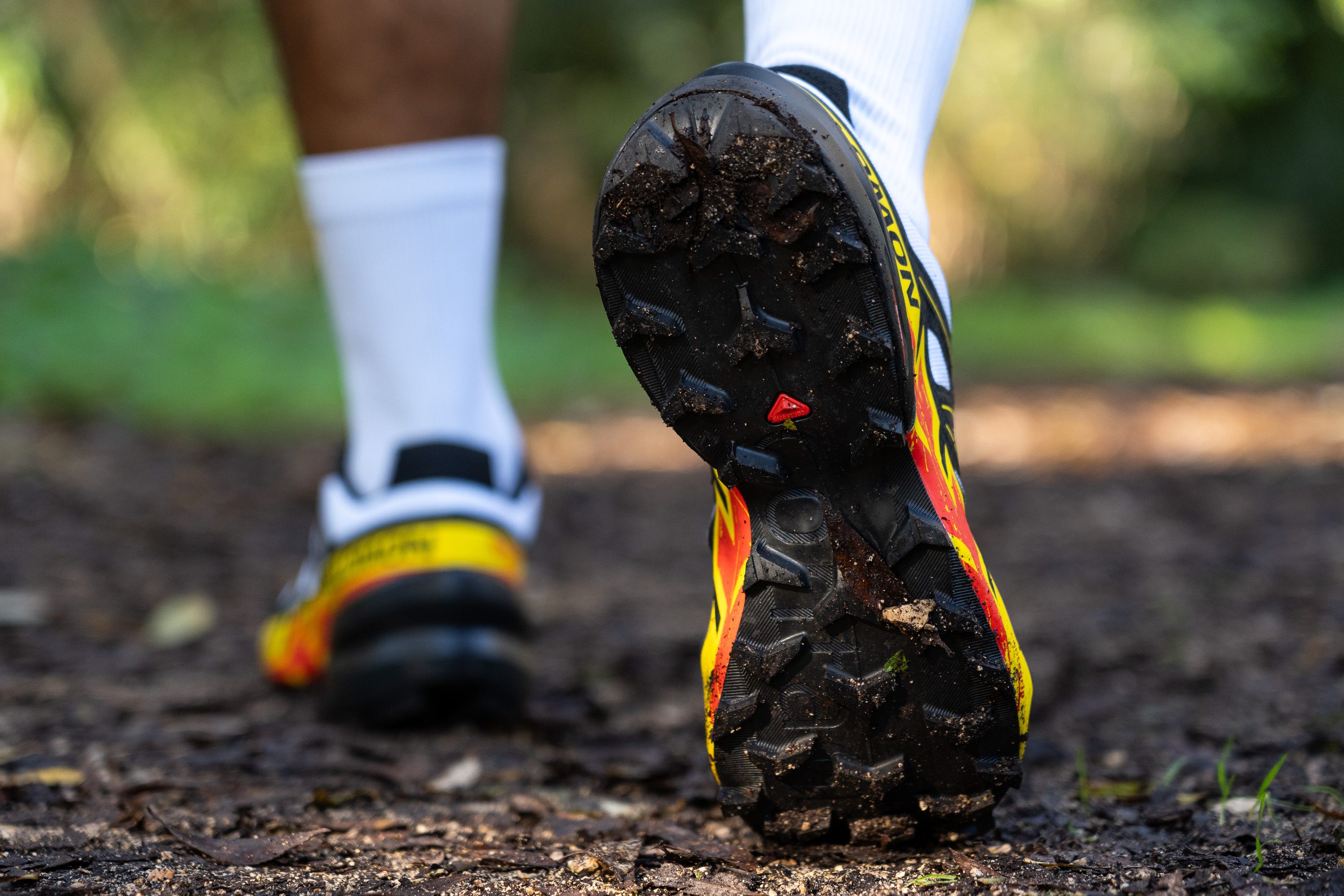
Flexibility / Stiffness
Although the Speedcross 6 is quite stiff torsionally, it's surprisingly flexible longitudinally. In our 30-degree bend test, we only needed to apply 12.7N of force to bend the shoe to the required angle.
This is great news for those who need the shoe to double up for long walks or hikes, offering the right blend of flexibility and support.
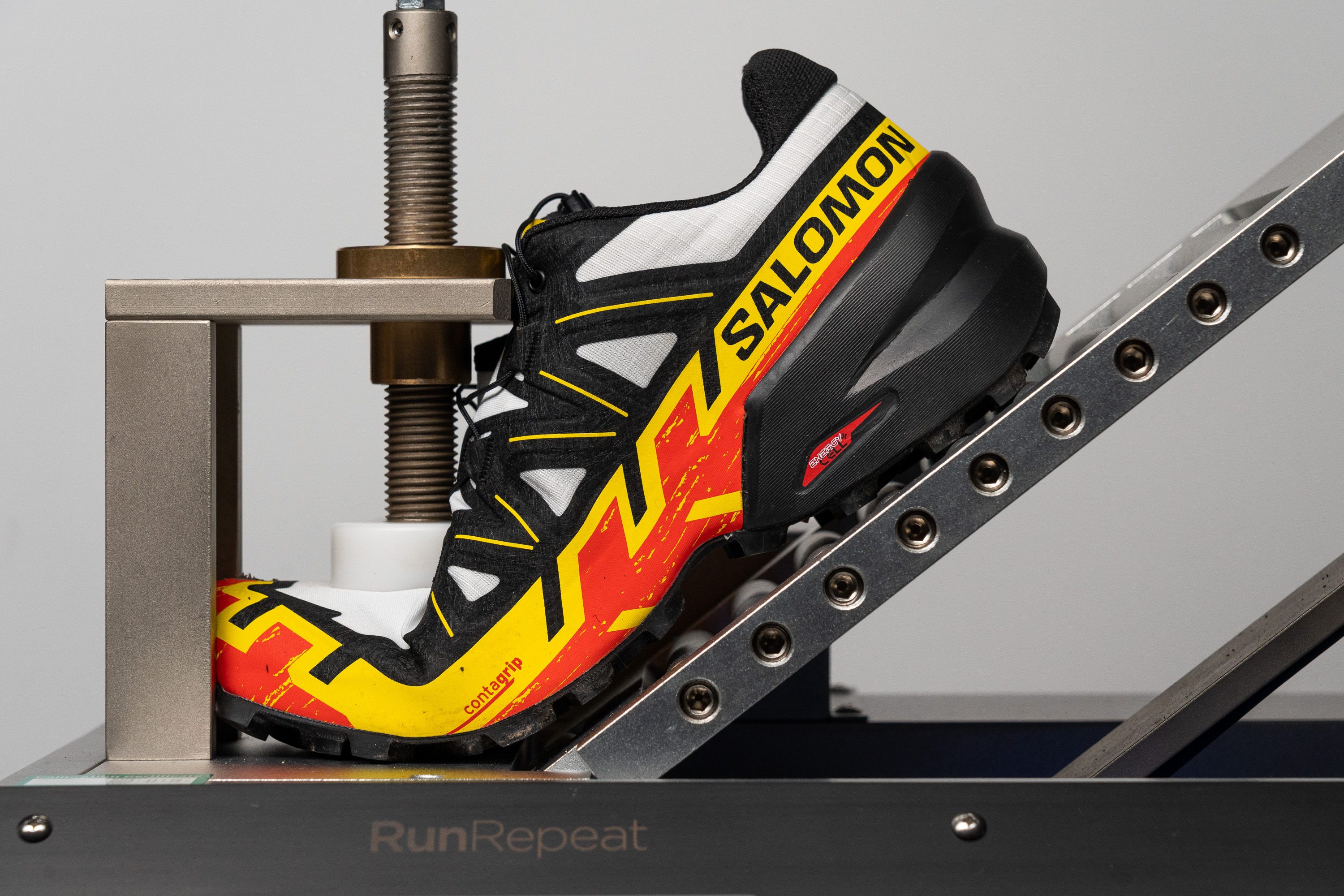
| Speedcross 6 | 12.7N |
| Average | 14.6N |
Stiffness in cold
After placing the shoe in the freezer a second time to simulate cold conditions, we repeated the test. This time, the result was a slightly higher 23.4N of force required.
| Speedcross 6 | 23.4N |
| Average | 35.9N |
Weight
Just by glancing at the Speedcross 6, it's clear it won't be the epitome of lightness, but it's actually lighter than we anticipated!
Weighing in at 10.4 oz (296g), Salomon has done an excellent job in keeping the weight surprisingly manageable for this type of shoe, especially considering the robust upper it boasts.
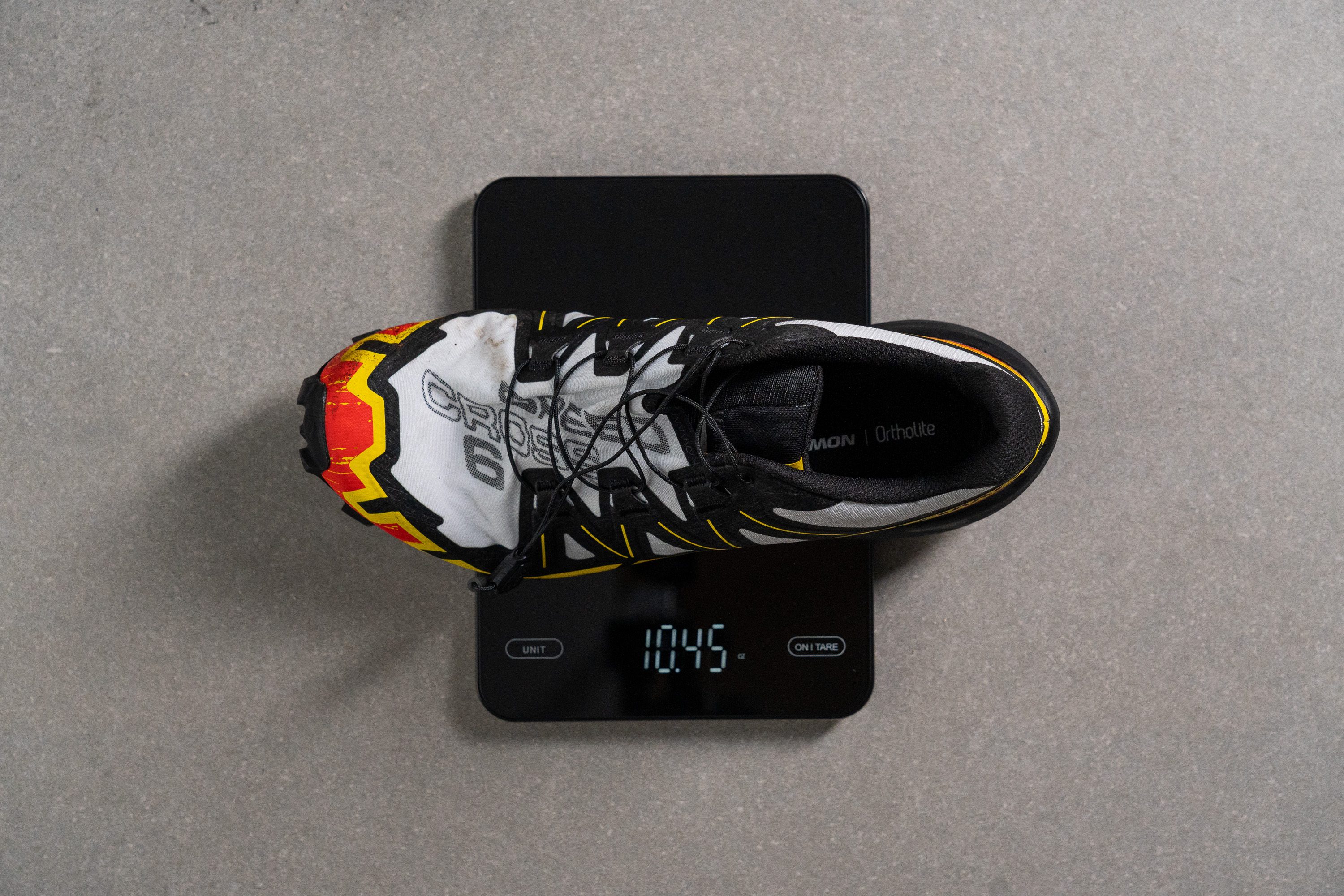
| Speedcross 6 | 10.4 oz (296g) |
| Average | 10.2 oz (289g) |
Breathability
The Salomon Speedcross 6 ranks as one of the least breathable shoes we've tested in the lab, matching even Gore-Tex models like the Nike Pegasus Trail 3 GTX with a score of 1/5 in our tests.
When we examined the shoe under a powerful light, it only reinforced our findings of poor breathability.
Further scrutiny under the microscope revealed a lack of ventilation holes, confirming the shoe's limited breathability.
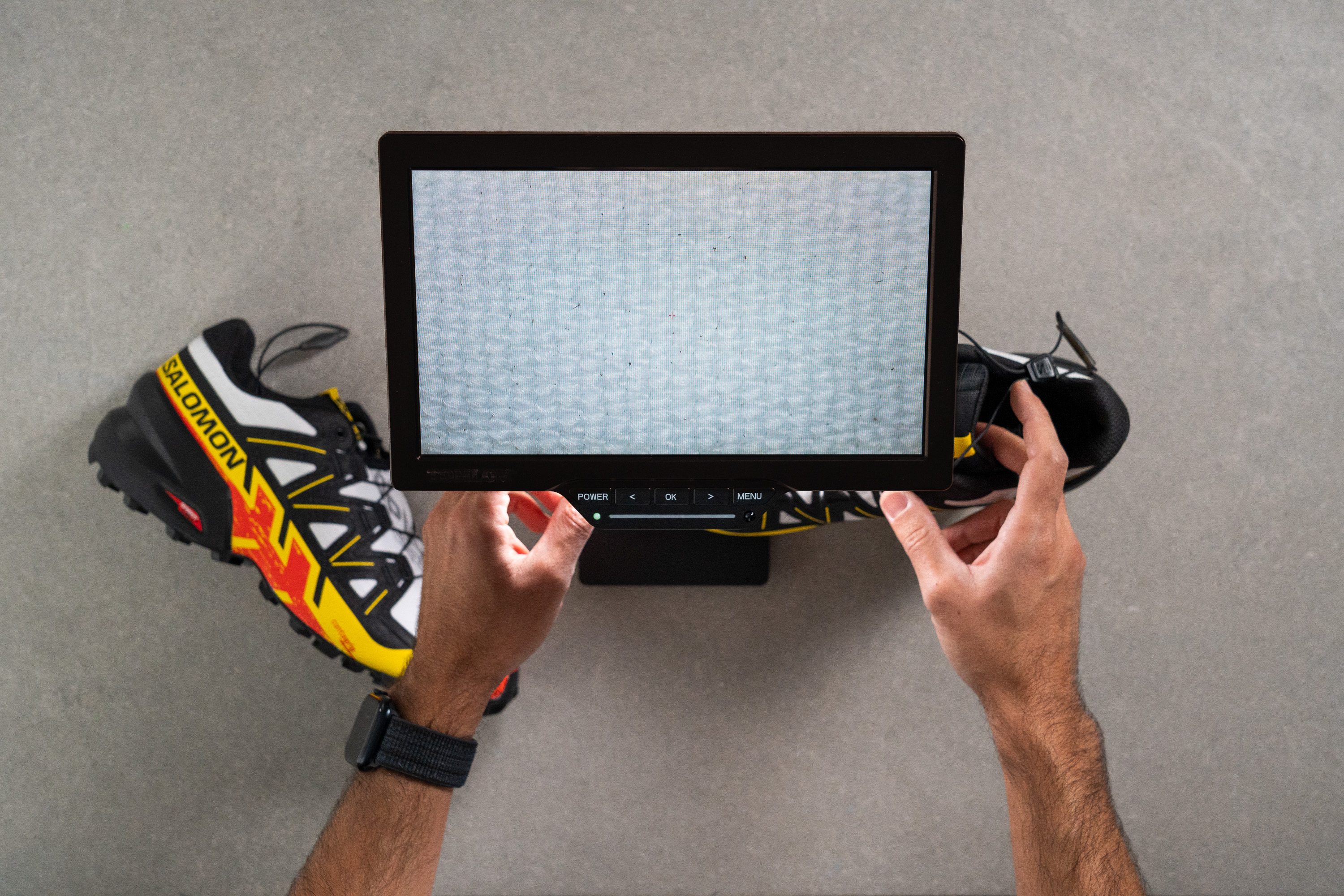
The thick, solid mesh upper traps heat inside the shoe.
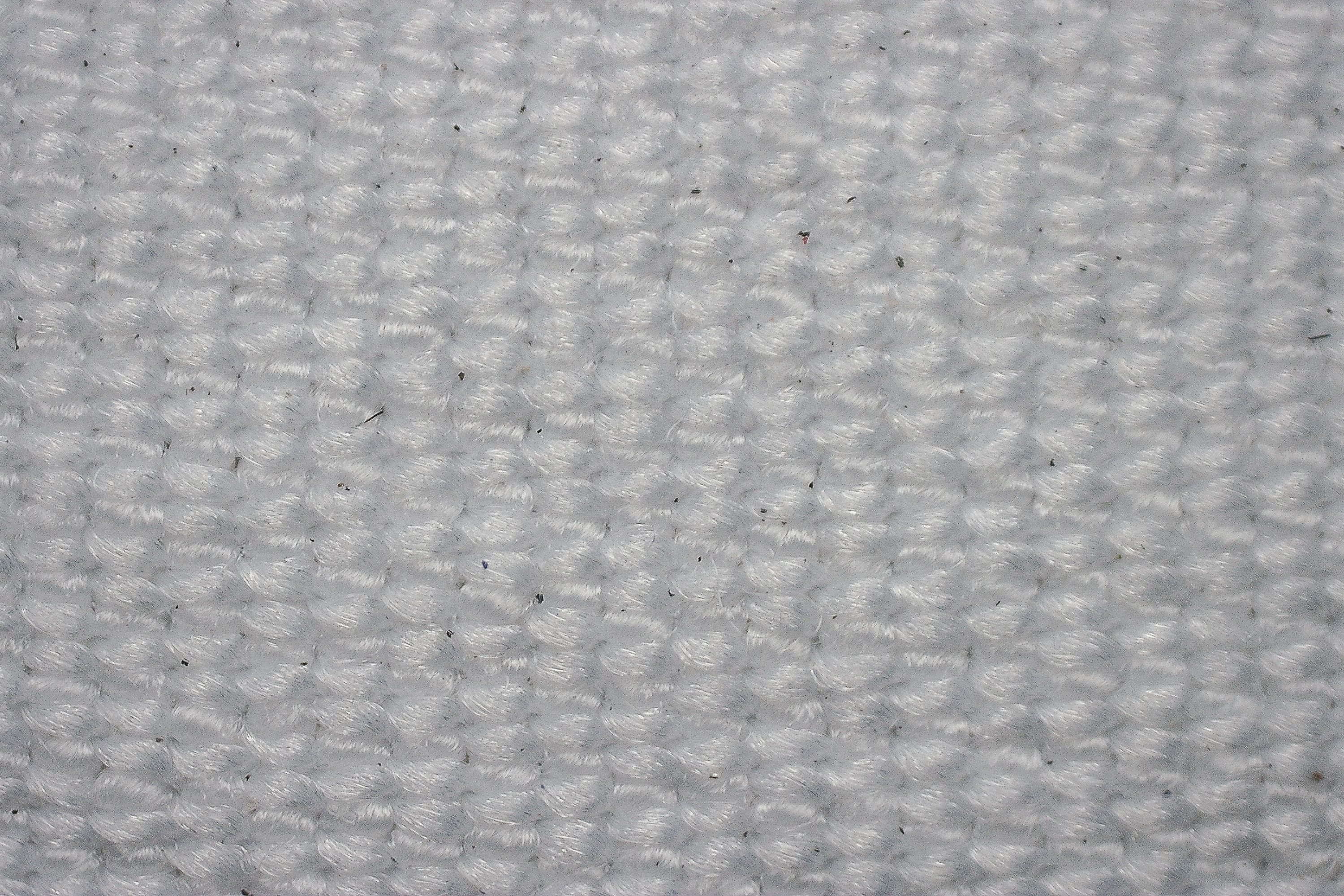
In summary, the poor airflow and limited flexibility raise concerns about potential discomfort during long runs. But it shouldn't be a problem in short or medium training sessions.
In summary, the Speedcross 6 will excel in harsh, extremely cold winter conditions, but it is not advisable for warm weather runs, as it could become uncomfortably hot and lead to blisters.
| Speedcross 6 | 1 |
| Average | 3.3 |
Stability
Lateral stability test
Employing a hard foam works wonders for stability, and the Speedcross 6 capitalizes on this.
The midsole slightly flares out at the heel for added support, while the insole is curved, creating a bathtub-like embrace for your feet. Overall, it offers a remarkably stable ride!
Torsional rigidity
The stiff sensation of the Speedcross 6 extends beyond just the upper to encompass the entire shoe. In our torsional rigidity assessment, it scored a 4 out of 5.
| Speedcross 6 | 4 |
| Average | 3.6 |
Heel counter stiffness
Similarly, the heel counter contributes to the overall experience by adding a stiff feel, enhancing stability.
This could potentially trade off some comfort, but it's a key factor in the shoe's support. We also rated it at a 4 out of 5.
| Speedcross 6 | 4 |
| Average | 3 |
Midsole width - forefoot
We were quite surprised to find that the shoe weighed less than 11 oz, considering its tank-like construction. But the reason became clear when we measured the midsole dimensions.
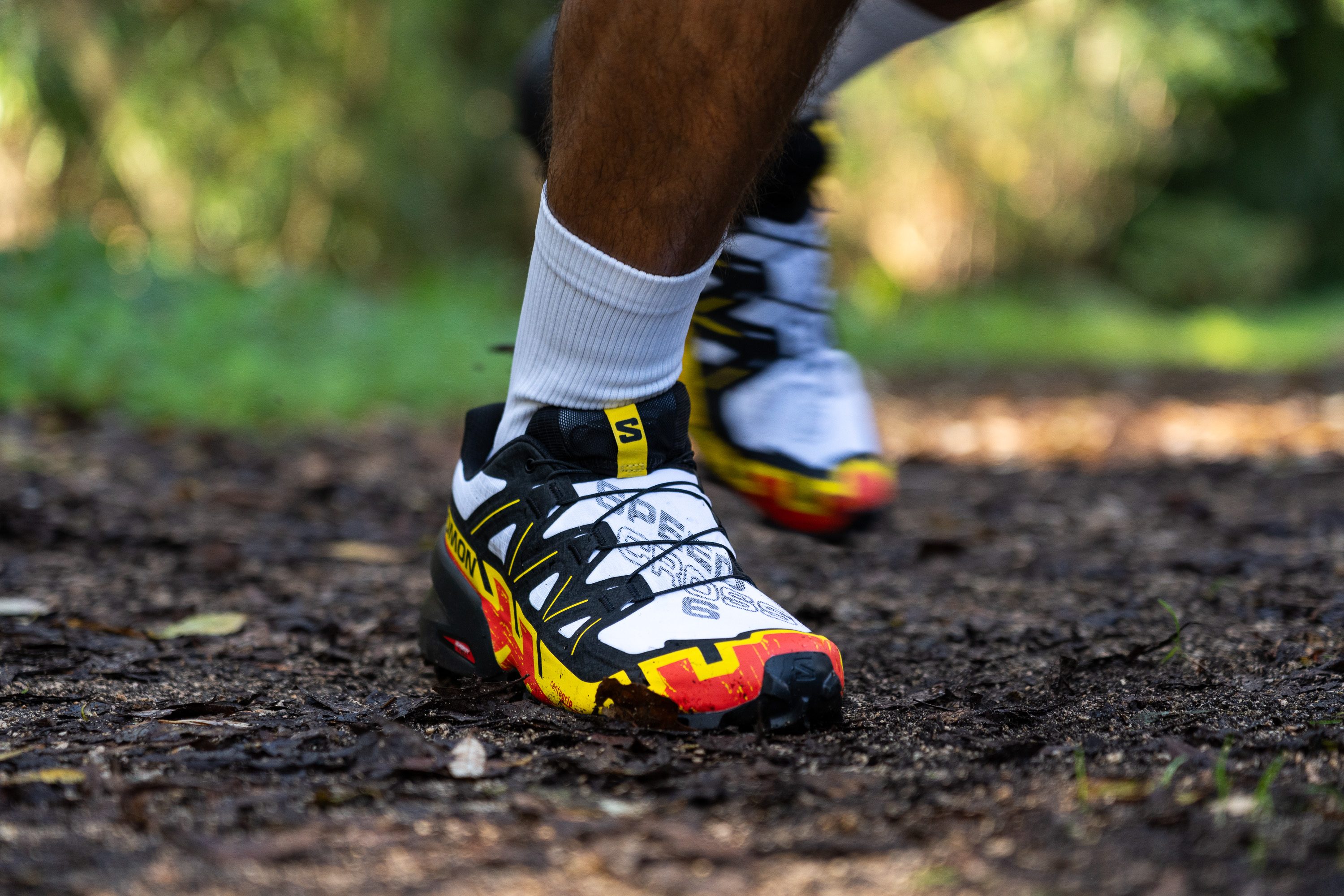
Measuring just 104.9 mm, Salomon has designed a narrow platform. This design choice aims for agility in corners and a nimble feel, while also keeping the weight down.
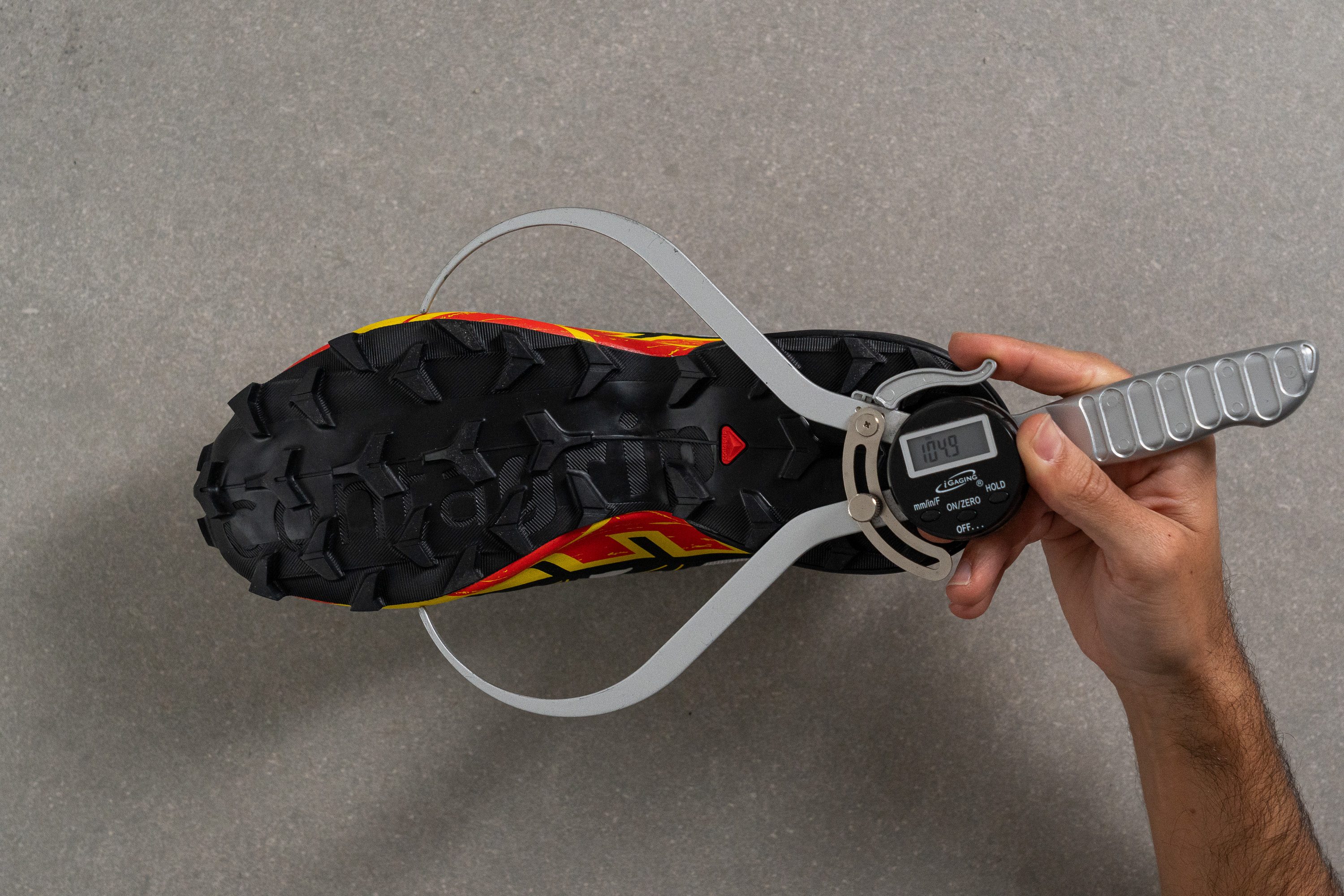
| Speedcross 6 | 104.9 mm |
| Average | 112.8 mm |
Midsole width - heel
The heel, measuring 87.3 mm, is more on par with what's typical for the average trail shoe. This design makes sense as the shoe is specifically tailored for heel strikers.
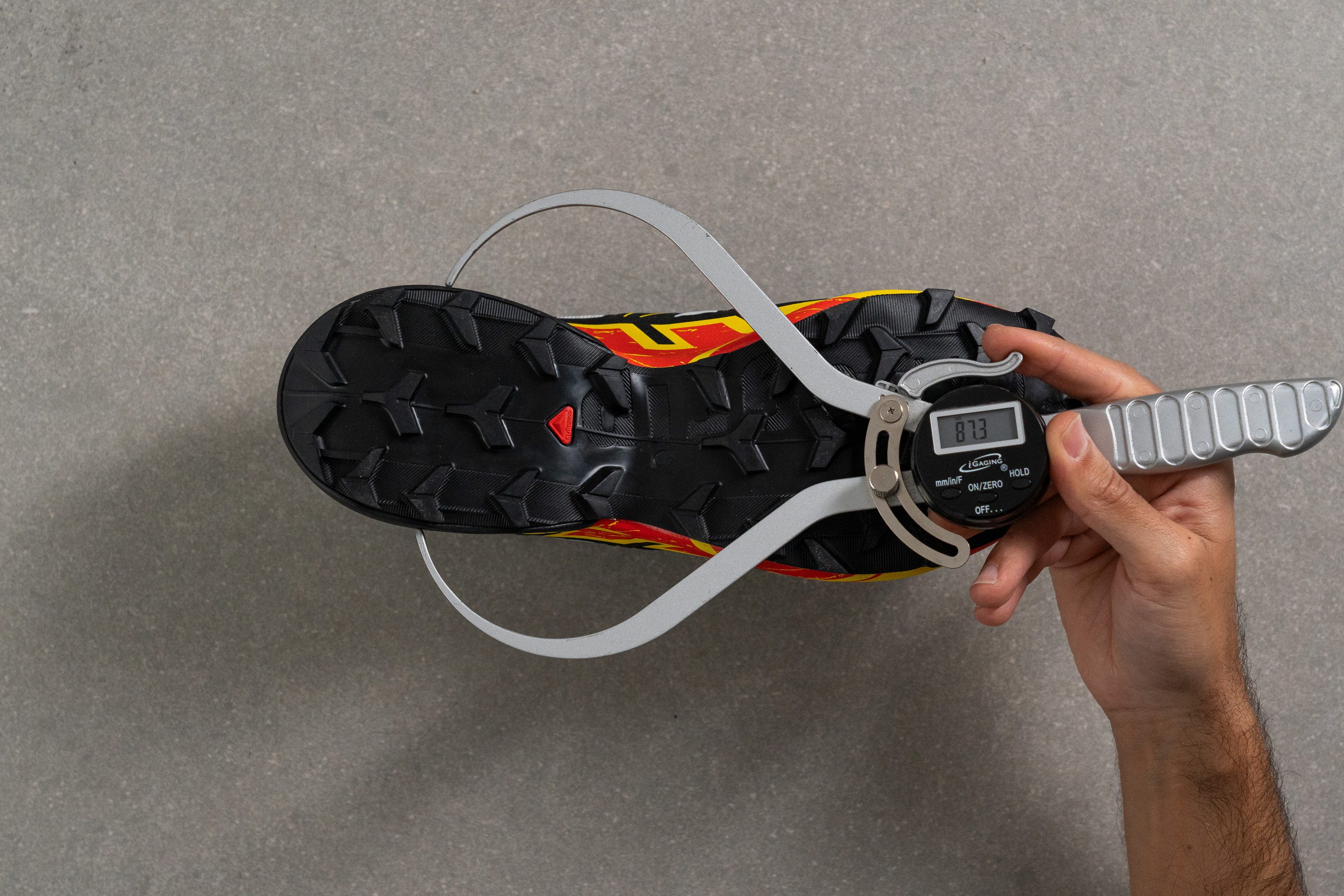
| Speedcross 6 | 87.3 mm |
| Average | 89.9 mm |
Durability
Toebox durability
On the bright side, equipped with a thick mesh and tons of protective layers, we expected robust durability, and the Speedcross 6 certainly delivered during our Dremel test.
We were thrilled to give it an impressive 4/5 rating!
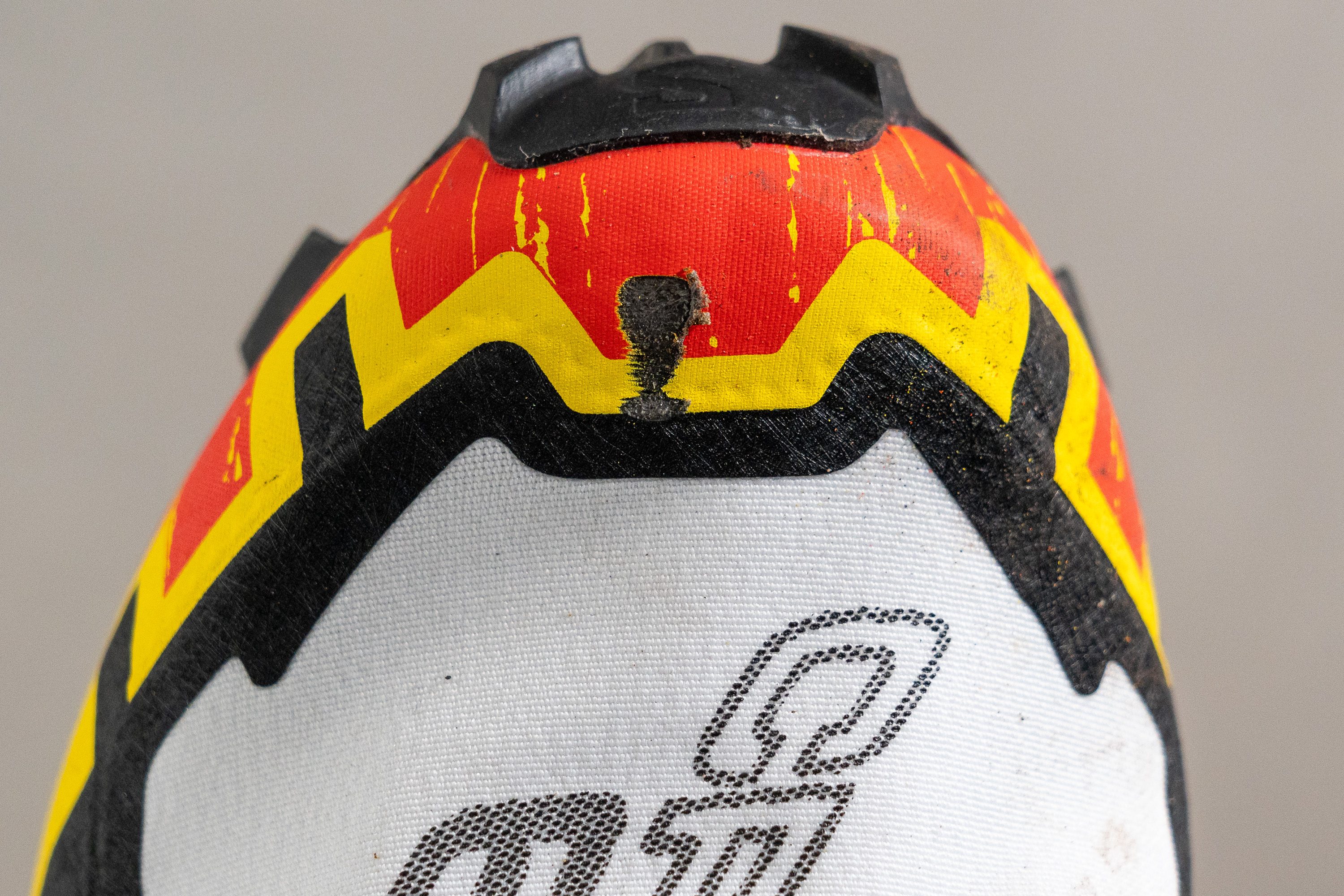
| Speedcross 6 | 4 |
| Average | 3.1 |
Heel padding durability
Unfortunately, the heel padding durability test didn't measure up, falling short compared to other trail running shoes.
However, this should only be a concern for those who typically experience wear in this area of every shoe they use.
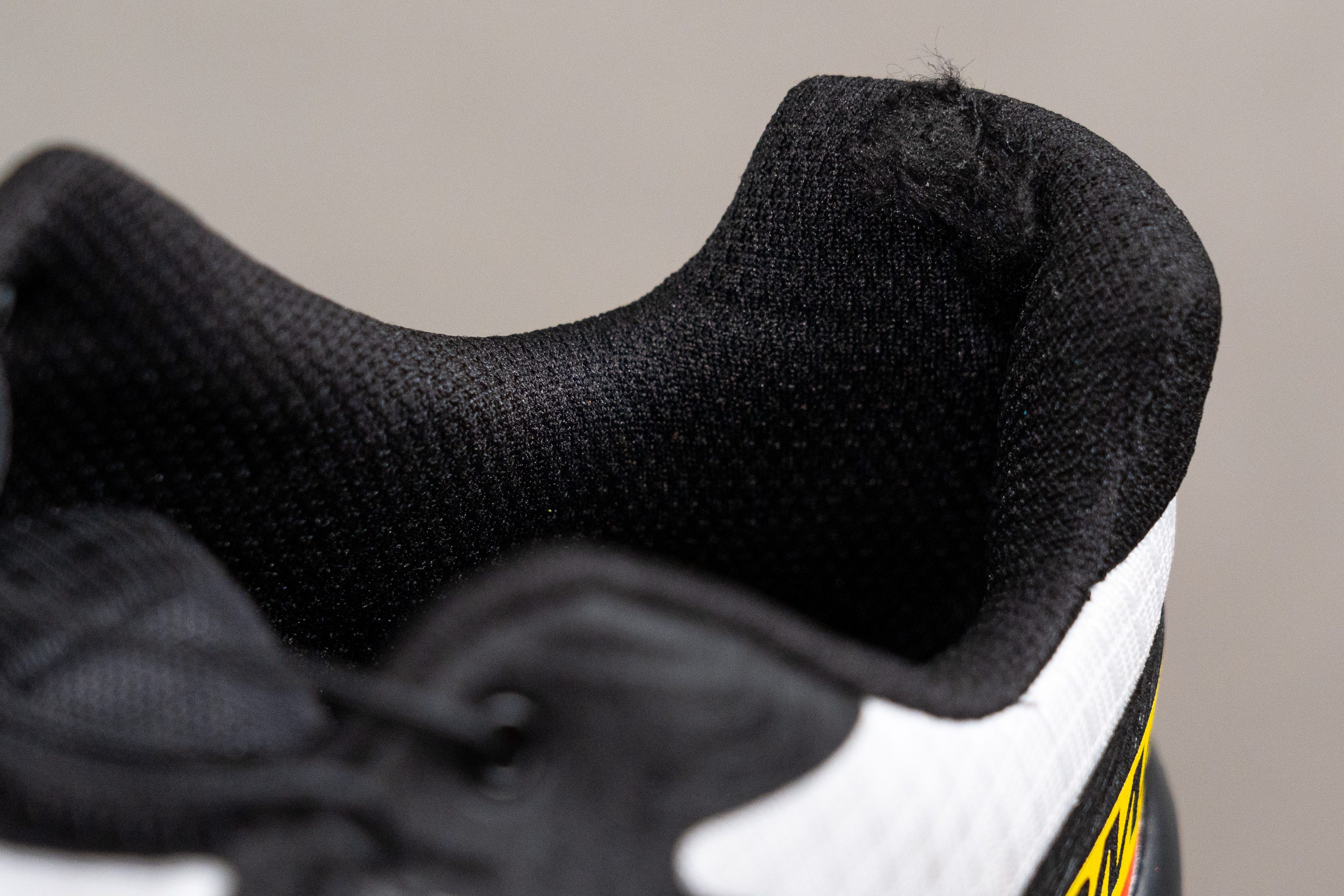
| Speedcross 6 | 2 |
| Average | 3 |
Outsole hardness
It registered 93.9 HC on our durometer, one of the highest readings we've ever recorded. This clearly indicates that Salomon is prioritizing durability in this model, putting less emphasis on other aspects.
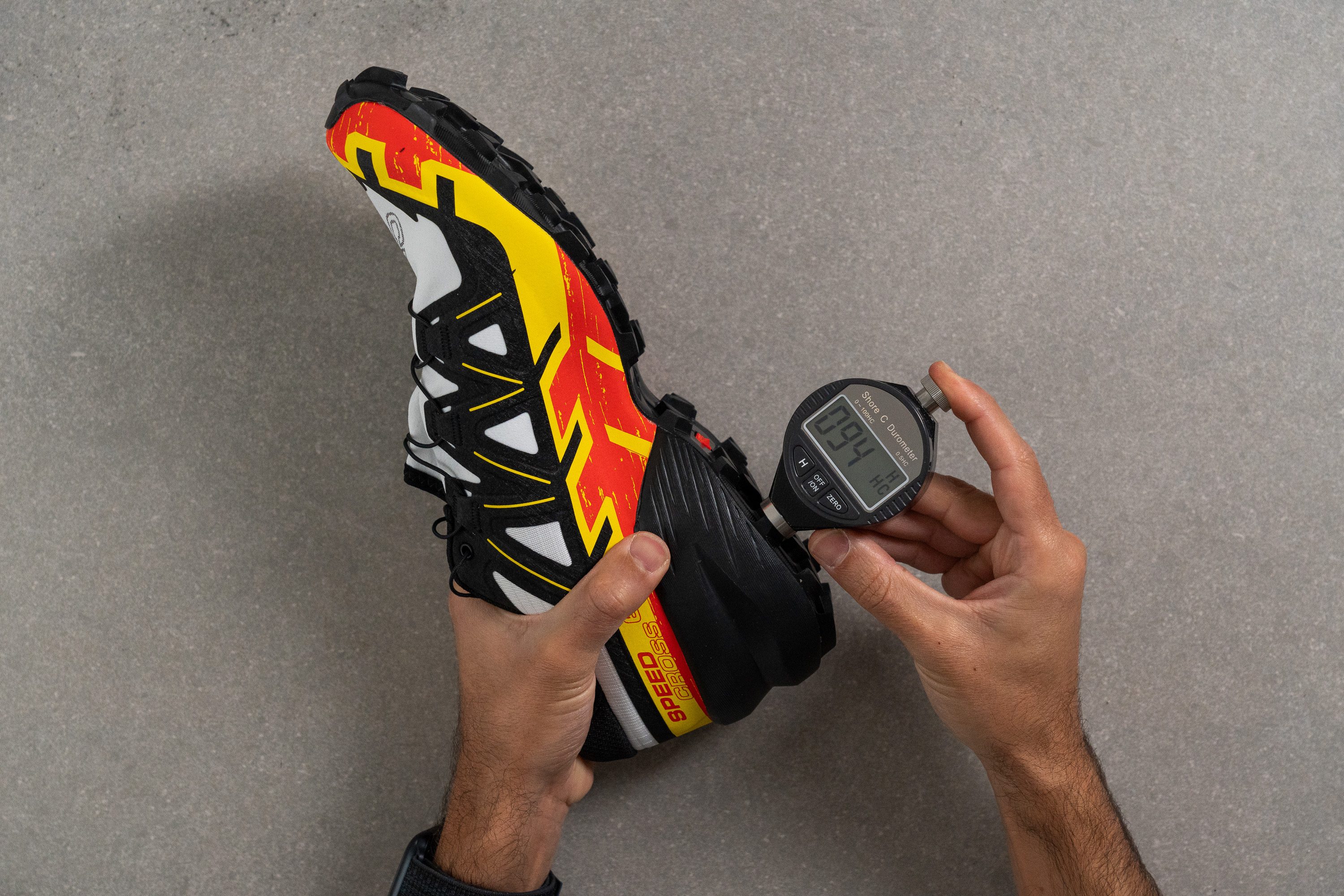
| Speedcross 6 | 93.9 HC |
| Average | 85.8 HC |
Outsole durability
However, we were surprised to find a 1.2-mm indentation in the outsole after our third Dremel test.
This wasn't the outcome we anticipated from a 93.9 HC rubber. It's important to note, though, that the huge lugs on this shoe—which we'll discuss later—do offer the benefit of being almost indestructible because of its size.
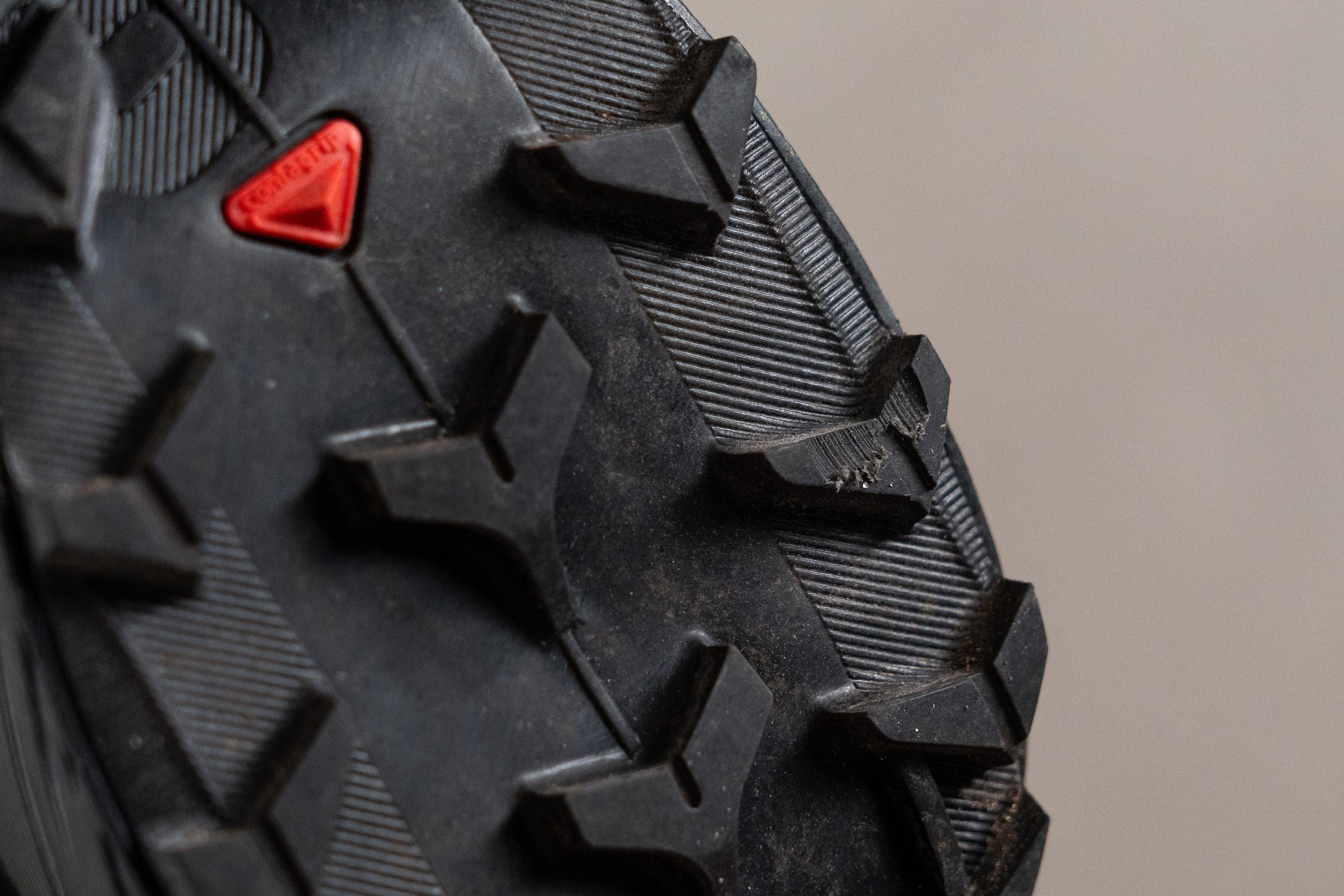
| Speedcross 6 | 1.2 mm |
| Average | 0.9 mm |
Outsole thickness
The outsole measures 1.9 mm, which is below average, but there's no cause for concern. As we mentioned earlier, the lugs on this shoe are really large and makes sense to use a thinner outsole.
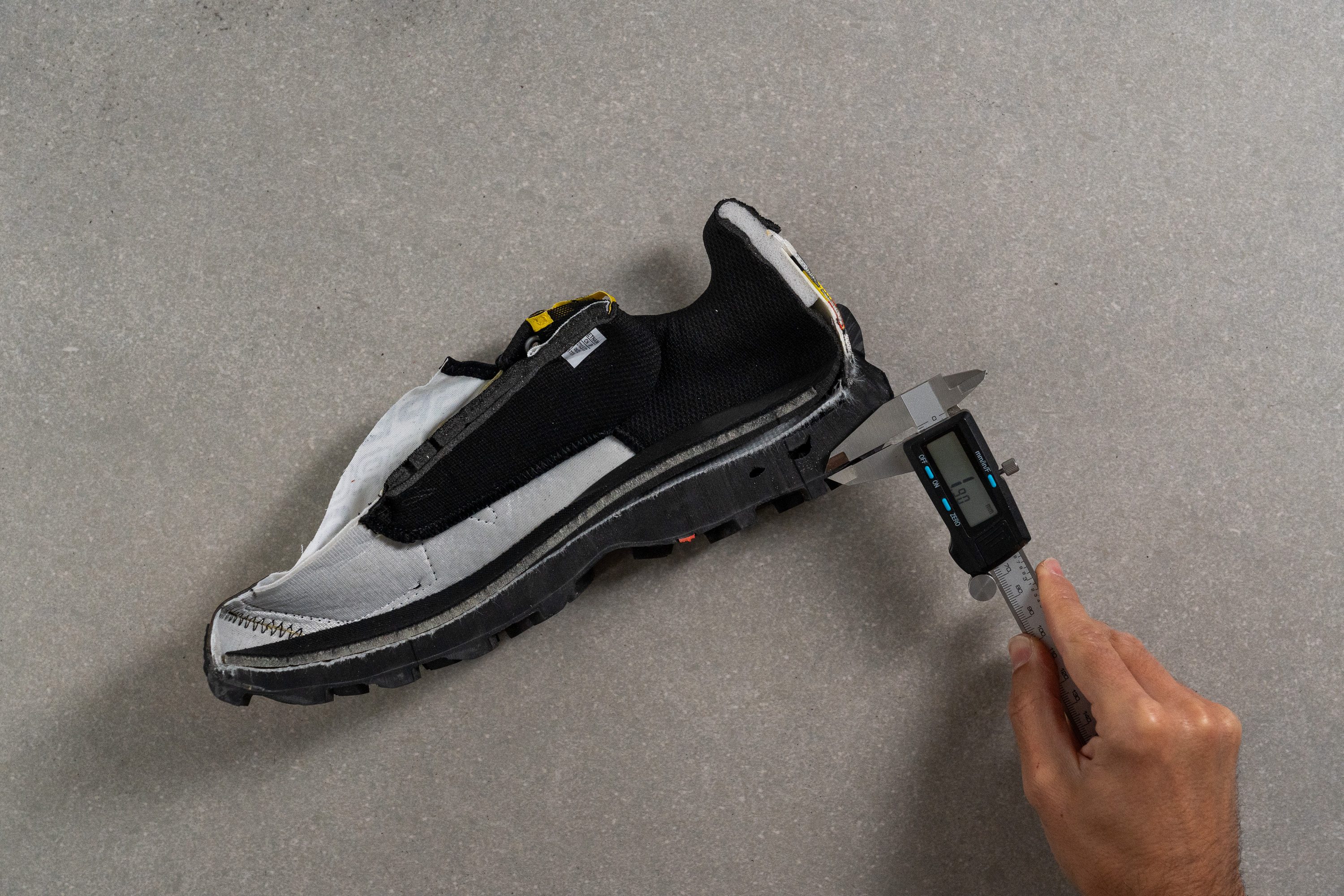
| Speedcross 6 | 1.9 mm |
| Average | 2.2 mm |
Misc
Insole thickness
We previously noted that the insole was thick, and indeed it is. Measuring 7.3 mm, it's nearly double what we typically find. Frankly, we would have preferred more foam and less insole underfoot, but that's how it is.
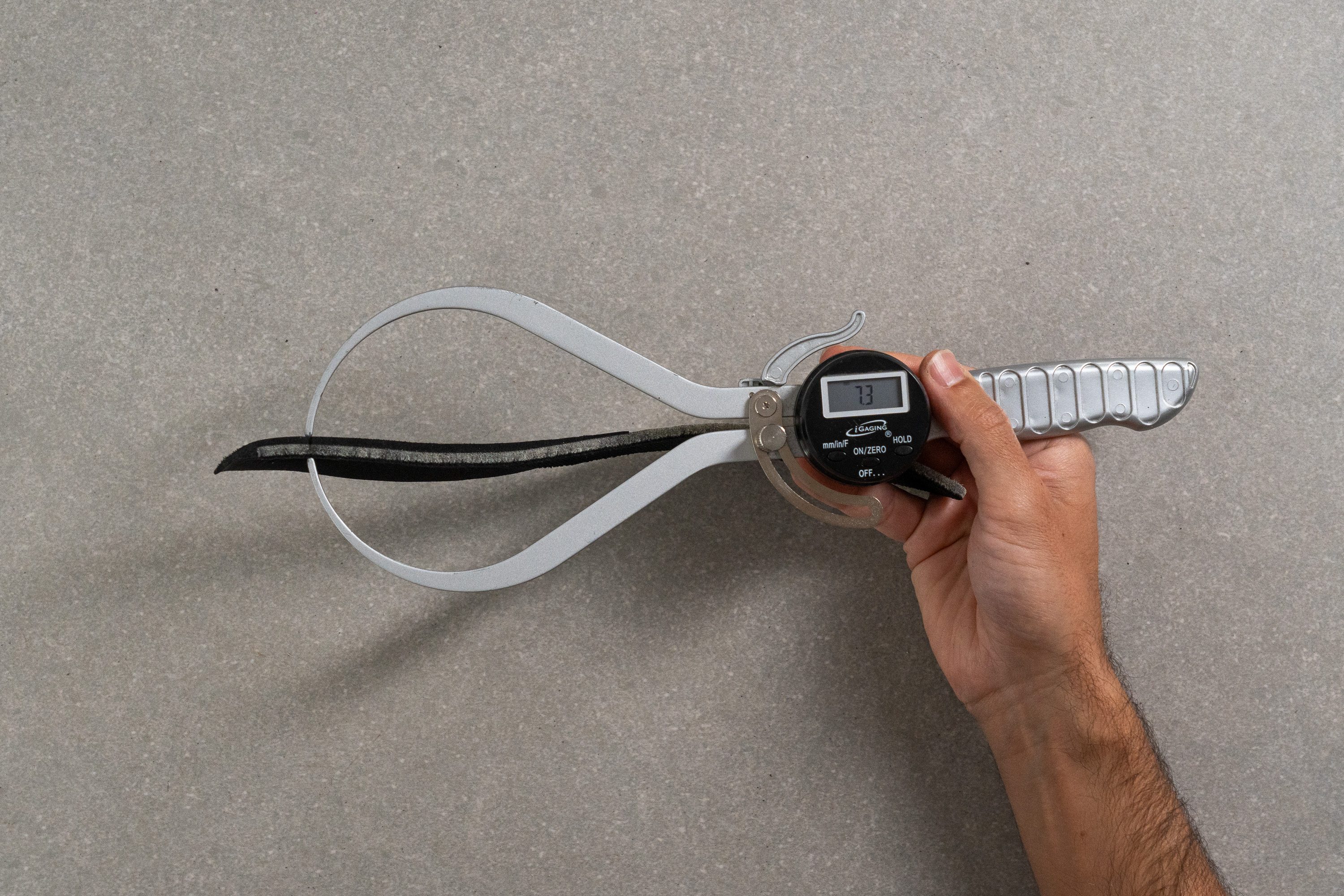
| Speedcross 6 | 7.3 mm |
| Average | 4.7 mm |
Removable insole
The insole is removable, but there's a catch—third-party insoles won't feel the same as the Ortholite insole included with the shoe.
This is because the standard insole has a rare, flared shape that enhances comfort and stability.
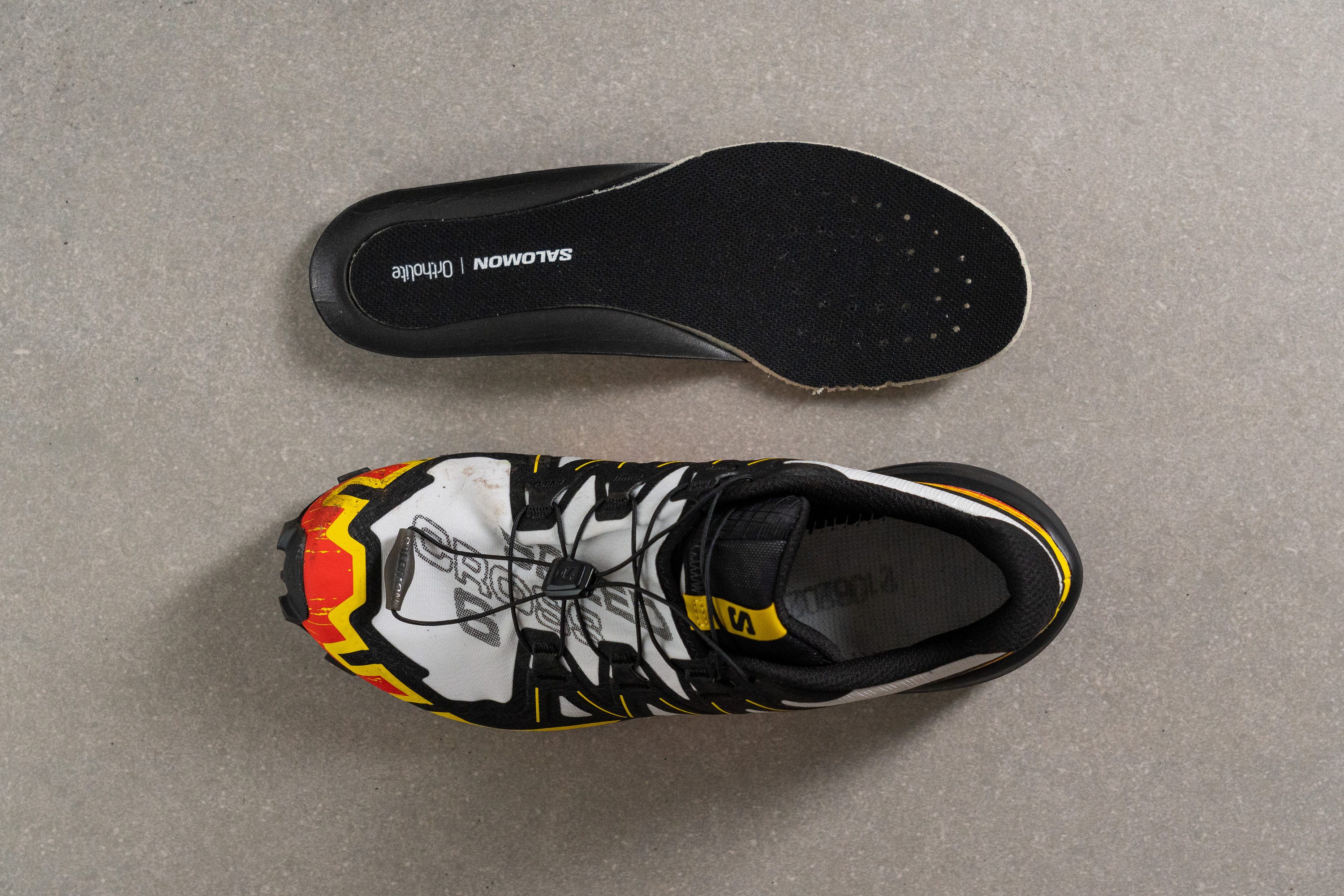
| Speedcross 6 | Yes |
Midsole softness in cold
In cold temperatures, the midsole retains a similar feel, and to quantify this, we remeasured it after 20 minutes in the freezer. The outcome was a slightly increased stiffness, registering at 37.8 HA.
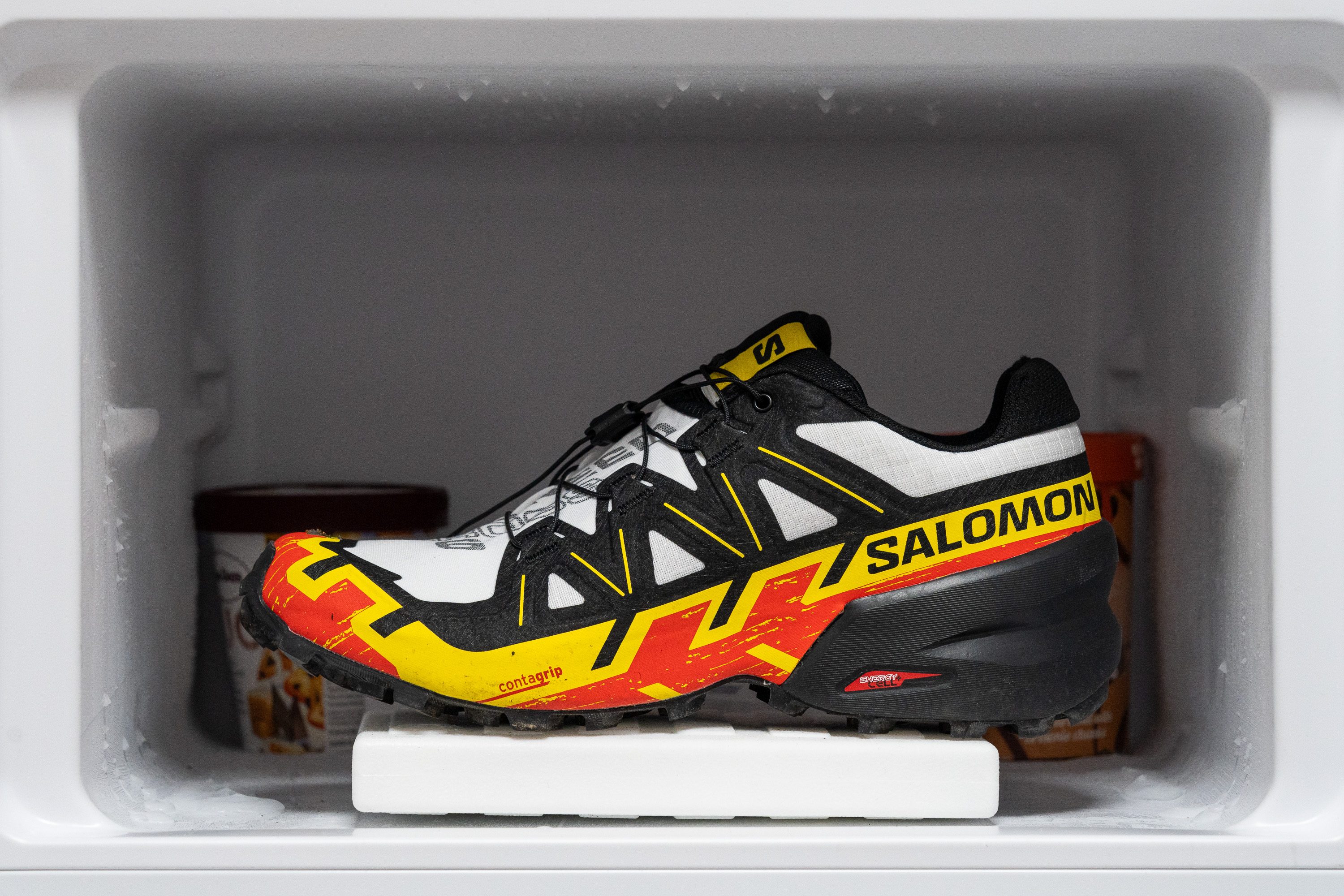
| Speedcross 6 | 37.8 HA |
| Average | 27.4 HA |
Midsole softness in cold (%)
The Energy Cell+ is an EVA-based midsole, typically expected to underperform in cold temperatures. However, we were pleasantly surprised to find only a 9.7% difference in stiffness.
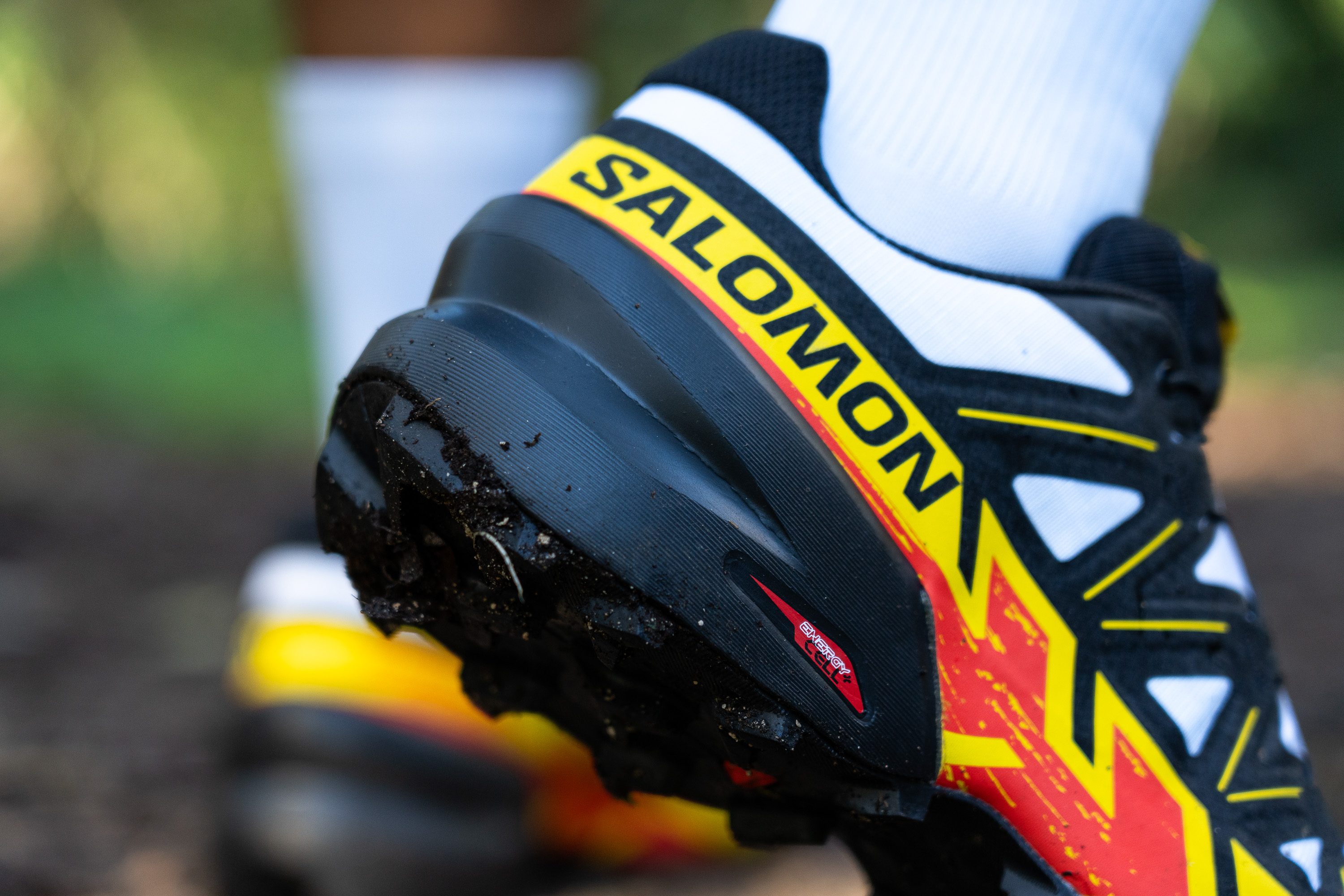
It's important to note, though, that being a notably firm midsole in mild temperatures means it becomes proportionally less hard than a softer foam in colder conditions.
| Speedcross 6 | 10% |
| Average | 26% |
Reflective elements
For a shoe designed for wild adventures where weight isn't a major constraint, it's disappointing that Salomon didn't incorporate any reflective elements.
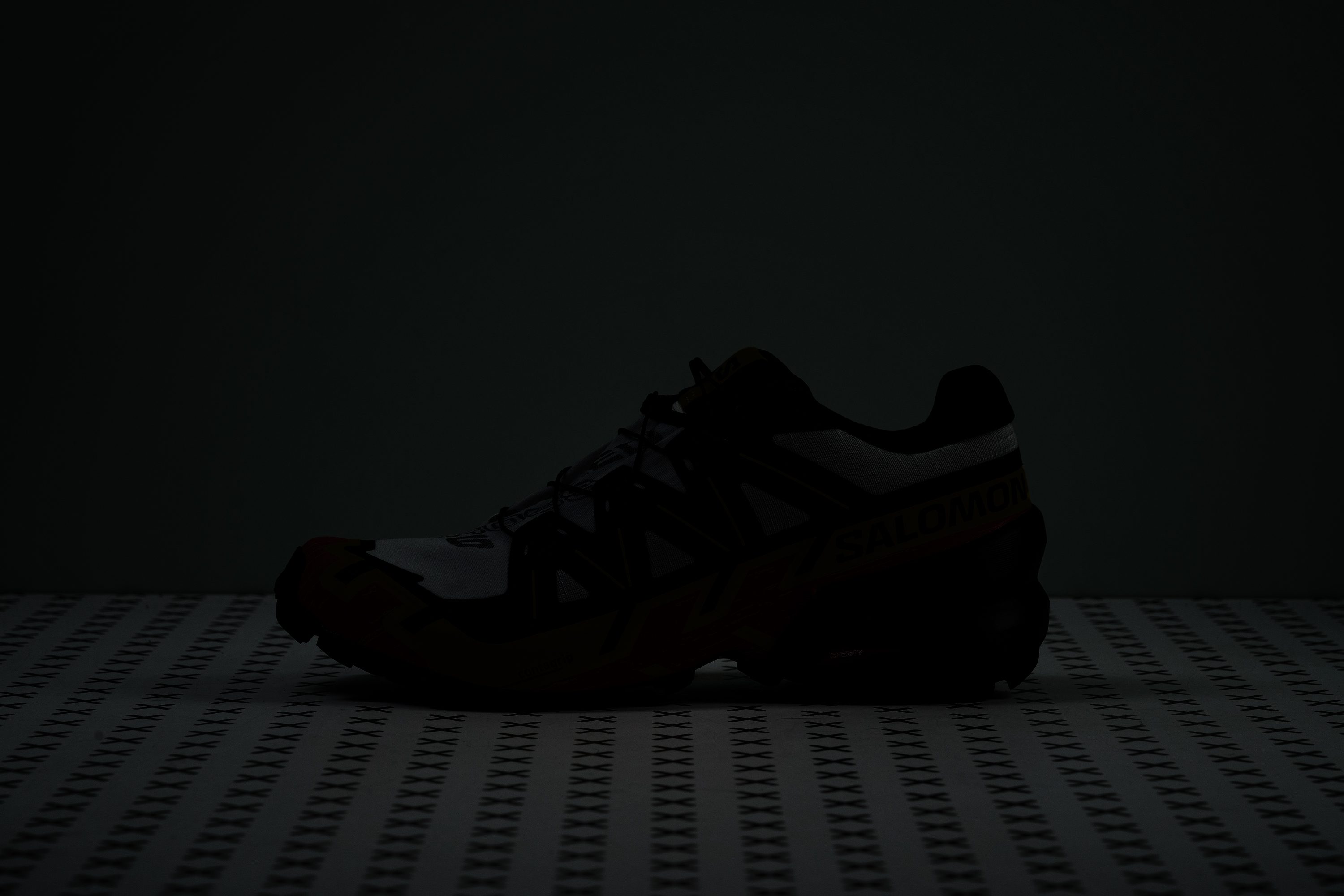
| Speedcross 6 | No |
Tongue padding
With a generous 8.6 mm of padding in the tongue, you can look forward to total comfort on your instep.
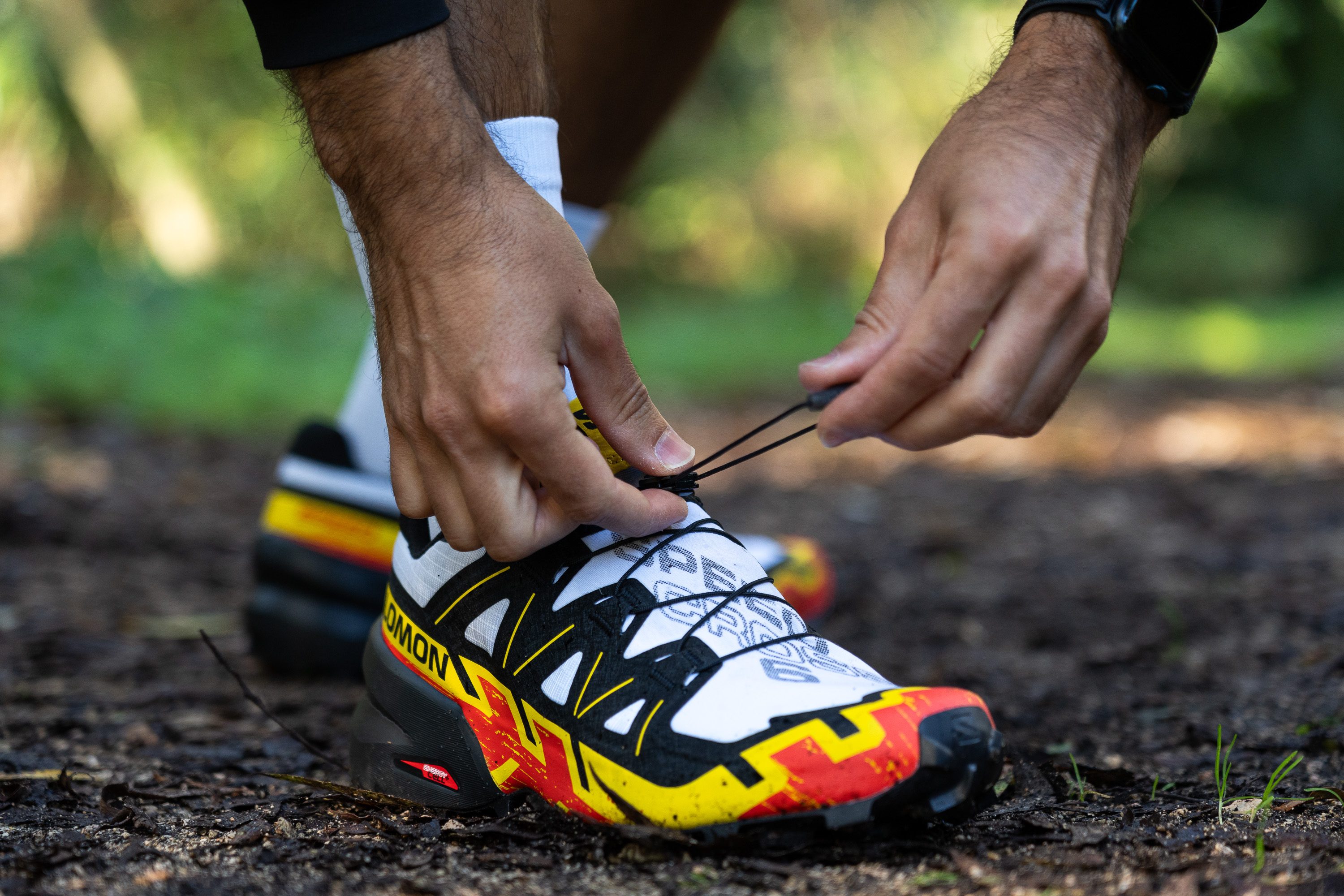
The Speedcross 6 comes with the famous Salomon QuickLace system, a feature many users really appreciate for saving precious seconds every time they gear up for a run.
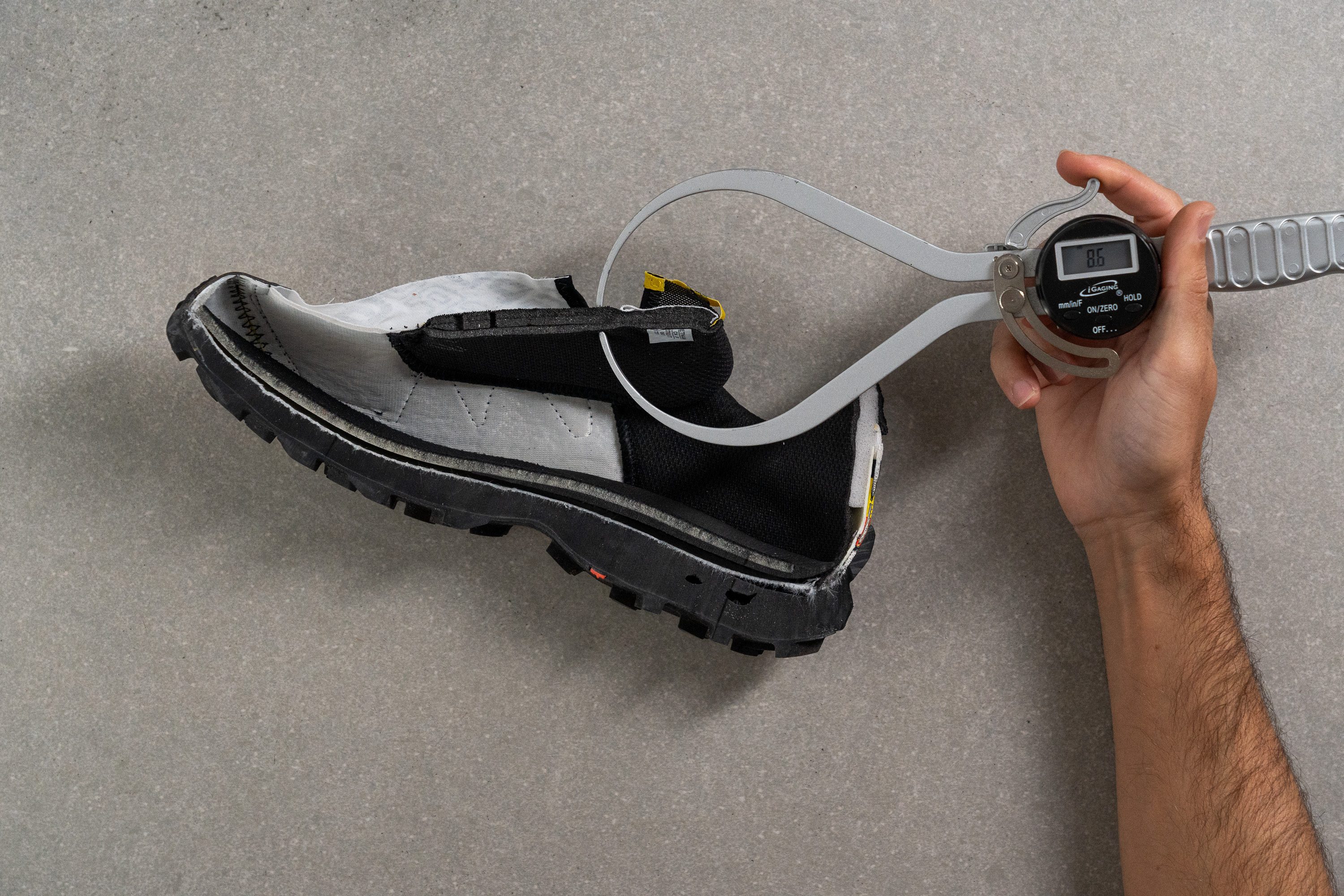
| Speedcross 6 | 8.6 mm |
| Average | 6.4 mm |
Tongue: gusset type
Although the tongue isn't gusseted, it's not a significant issue in this shoe, thanks to its unique, closed design.
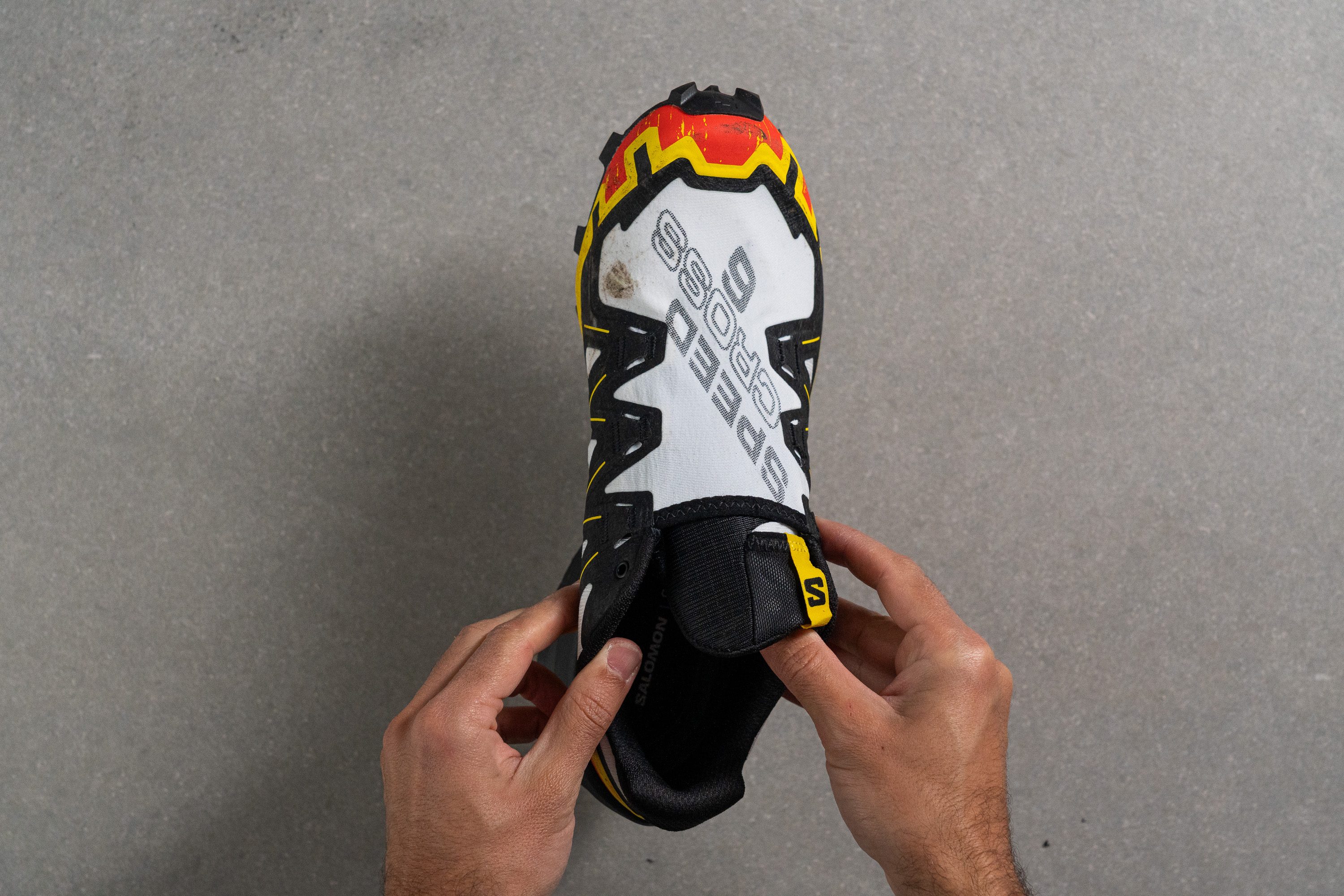
| Speedcross 6 | None |
Heel tab
Salomon opted out of adding a heel tab to the Speedcross 6. However, it's not essential for slipping your feet into the shoe, so its absence really boils down to aesthetic preferences.
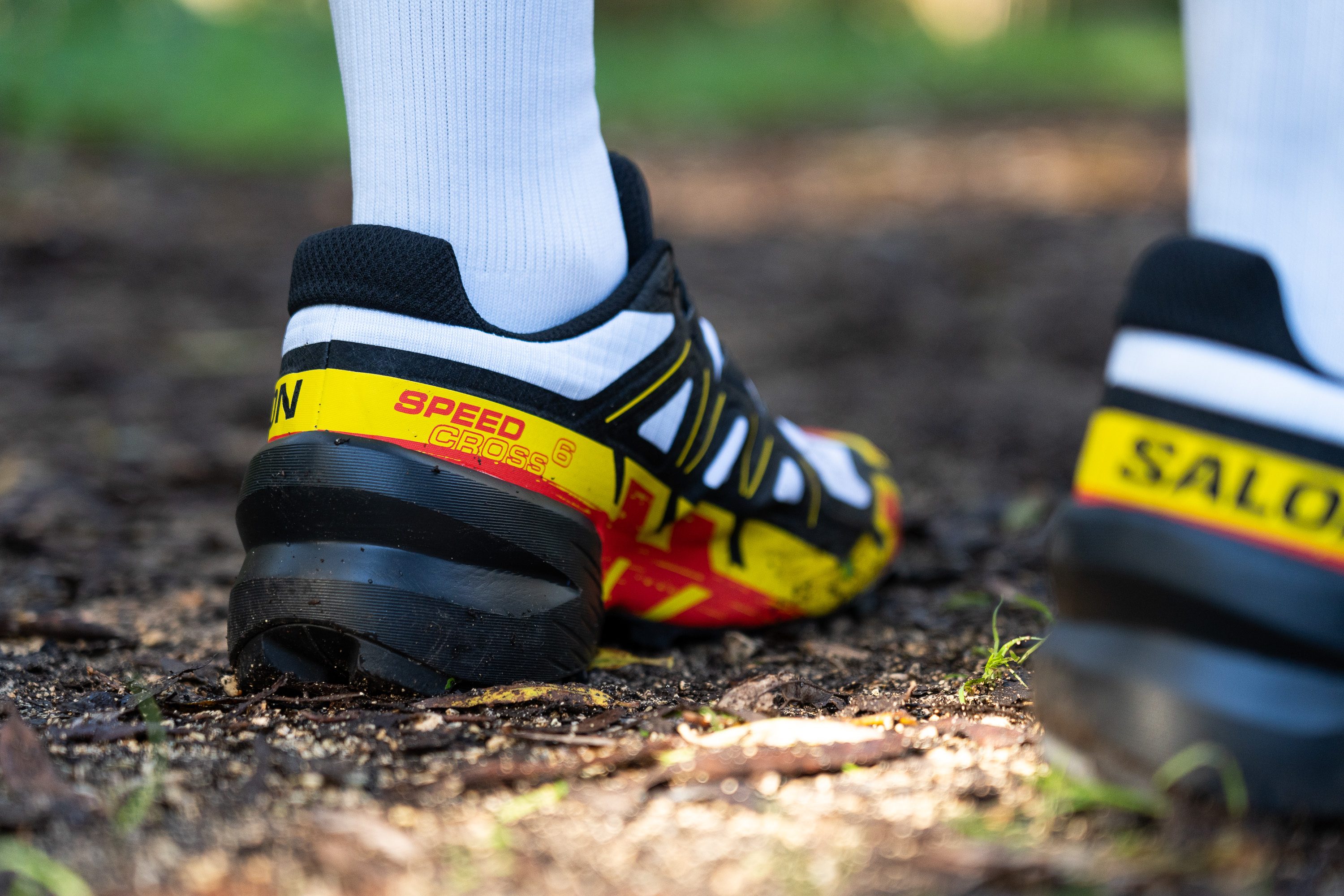
| Speedcross 6 | None |

